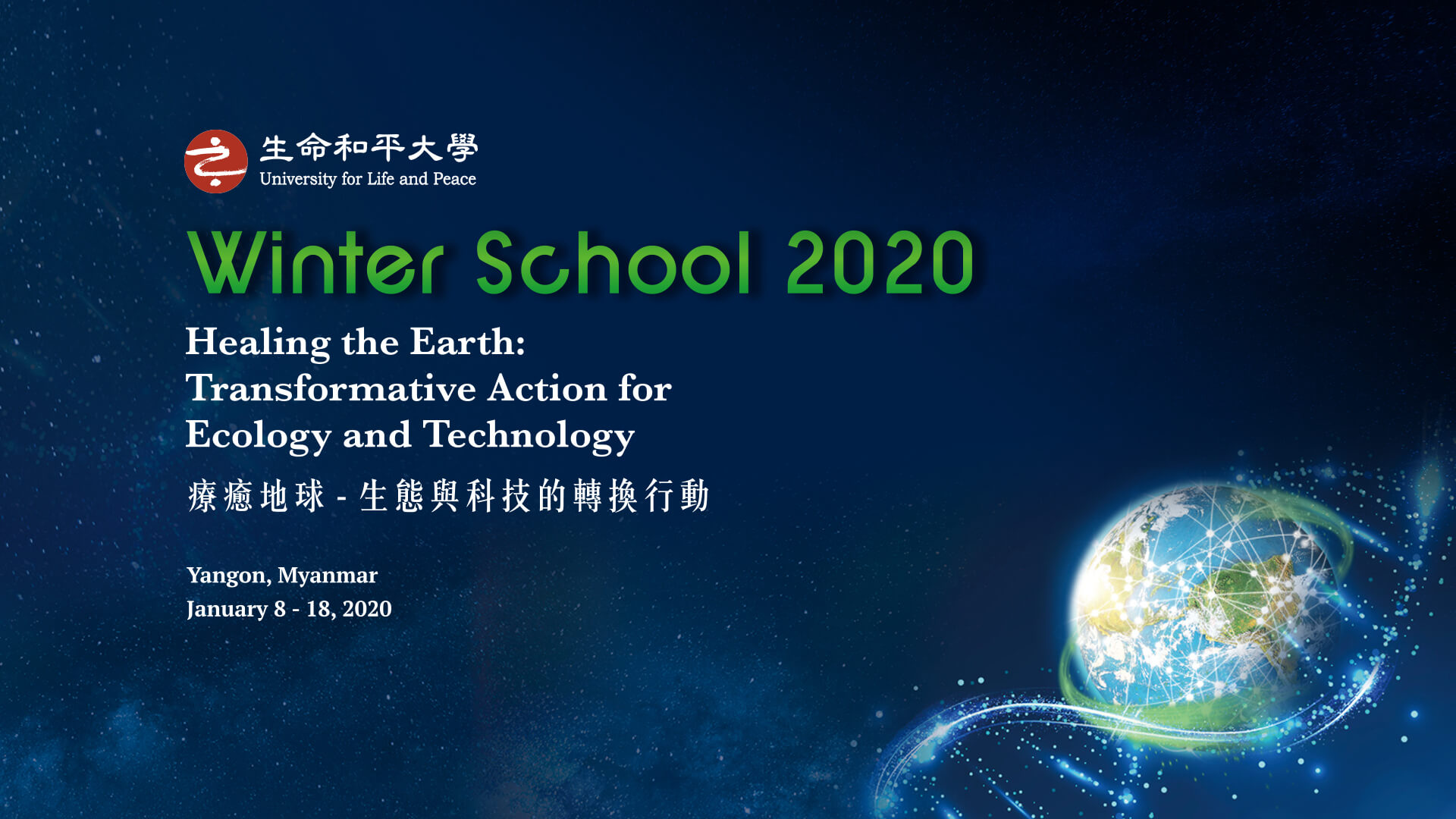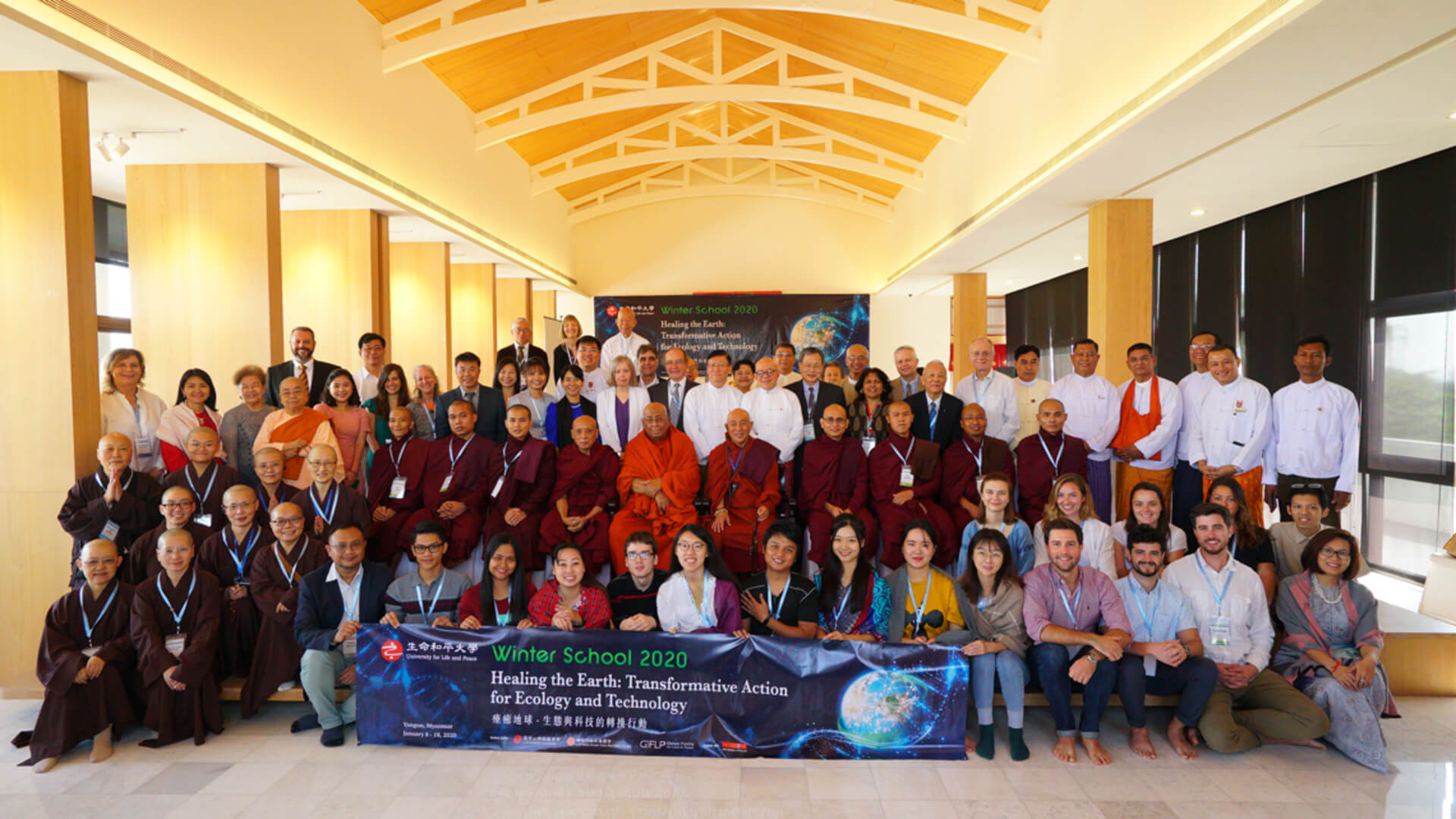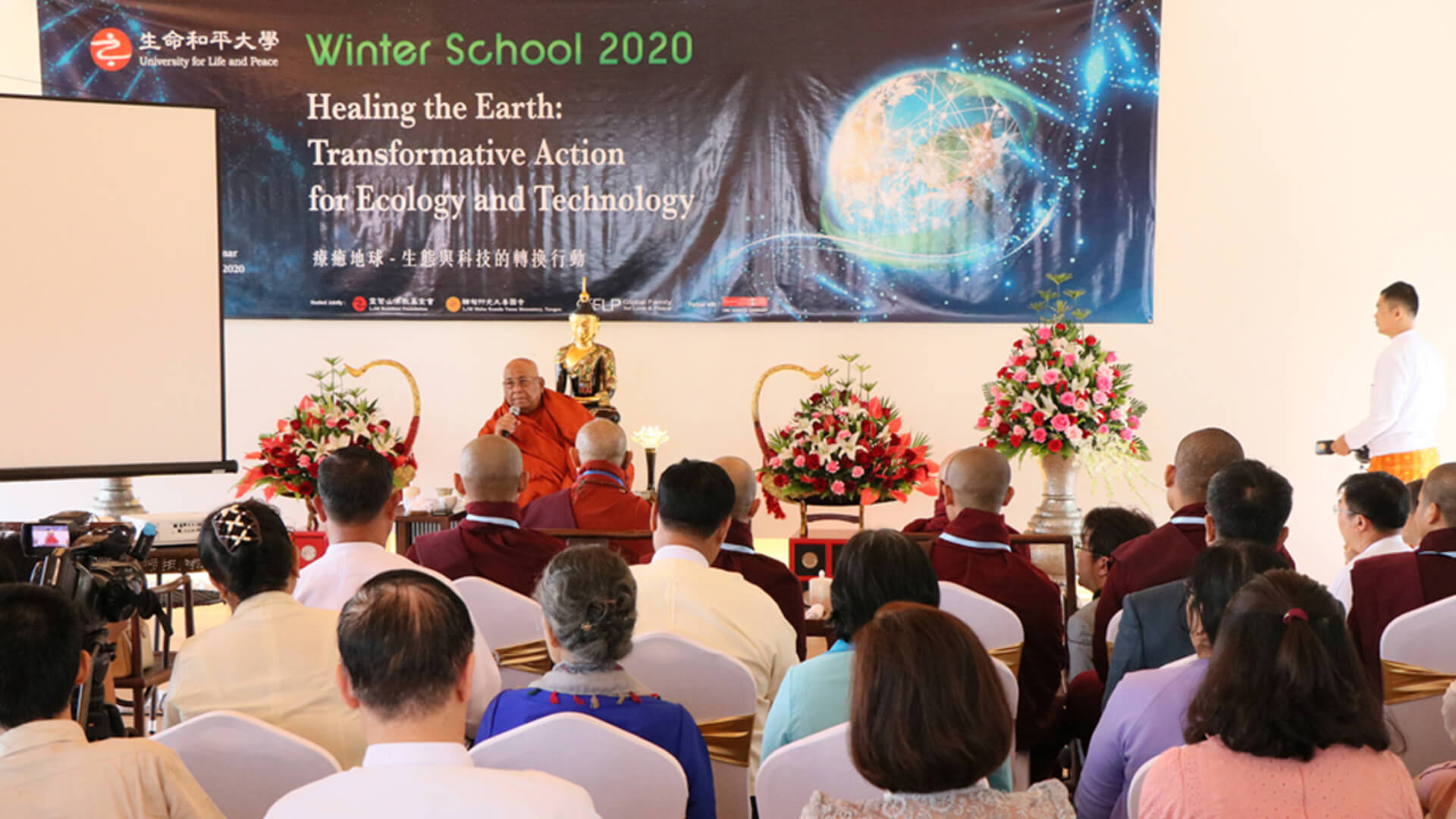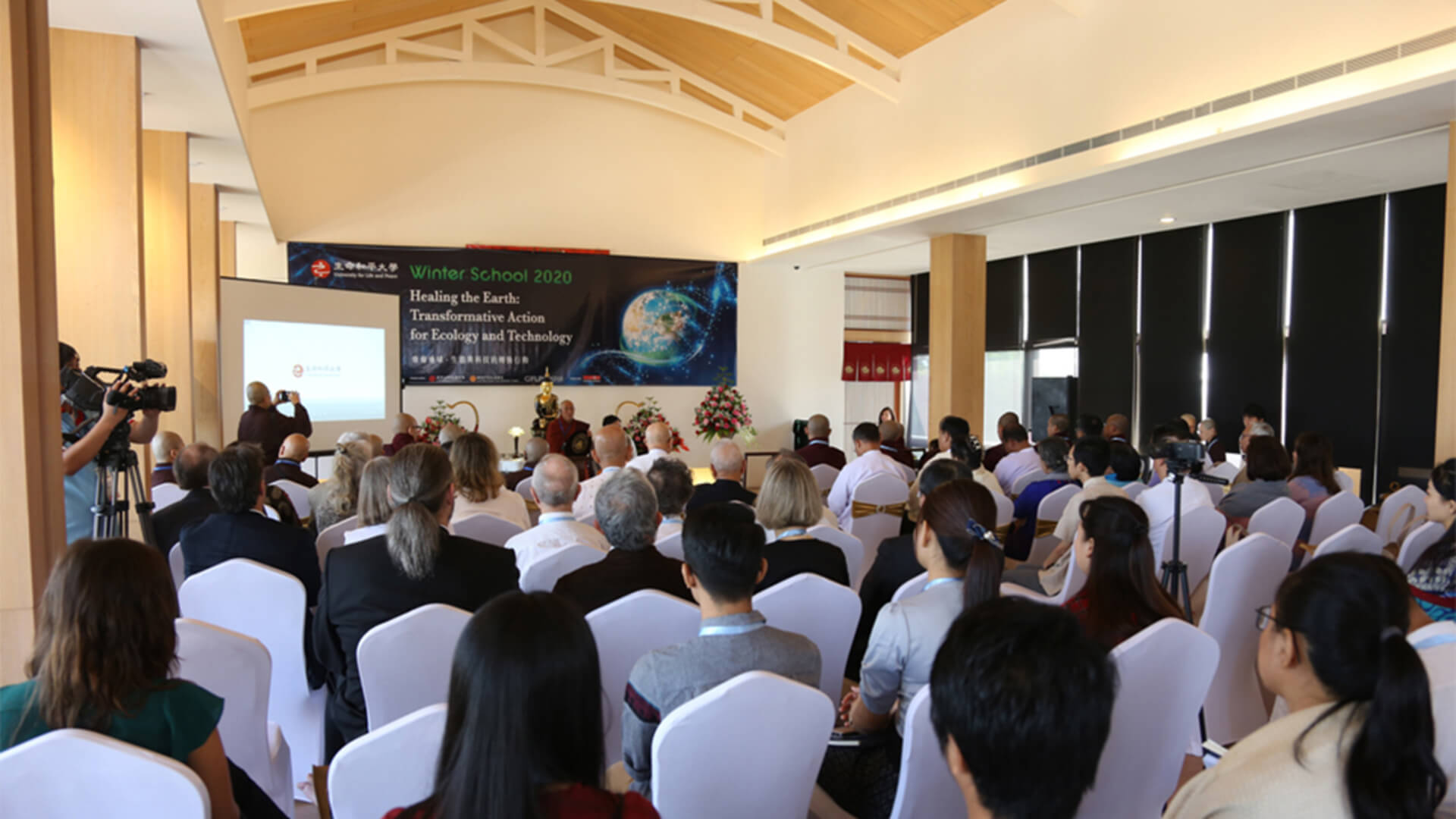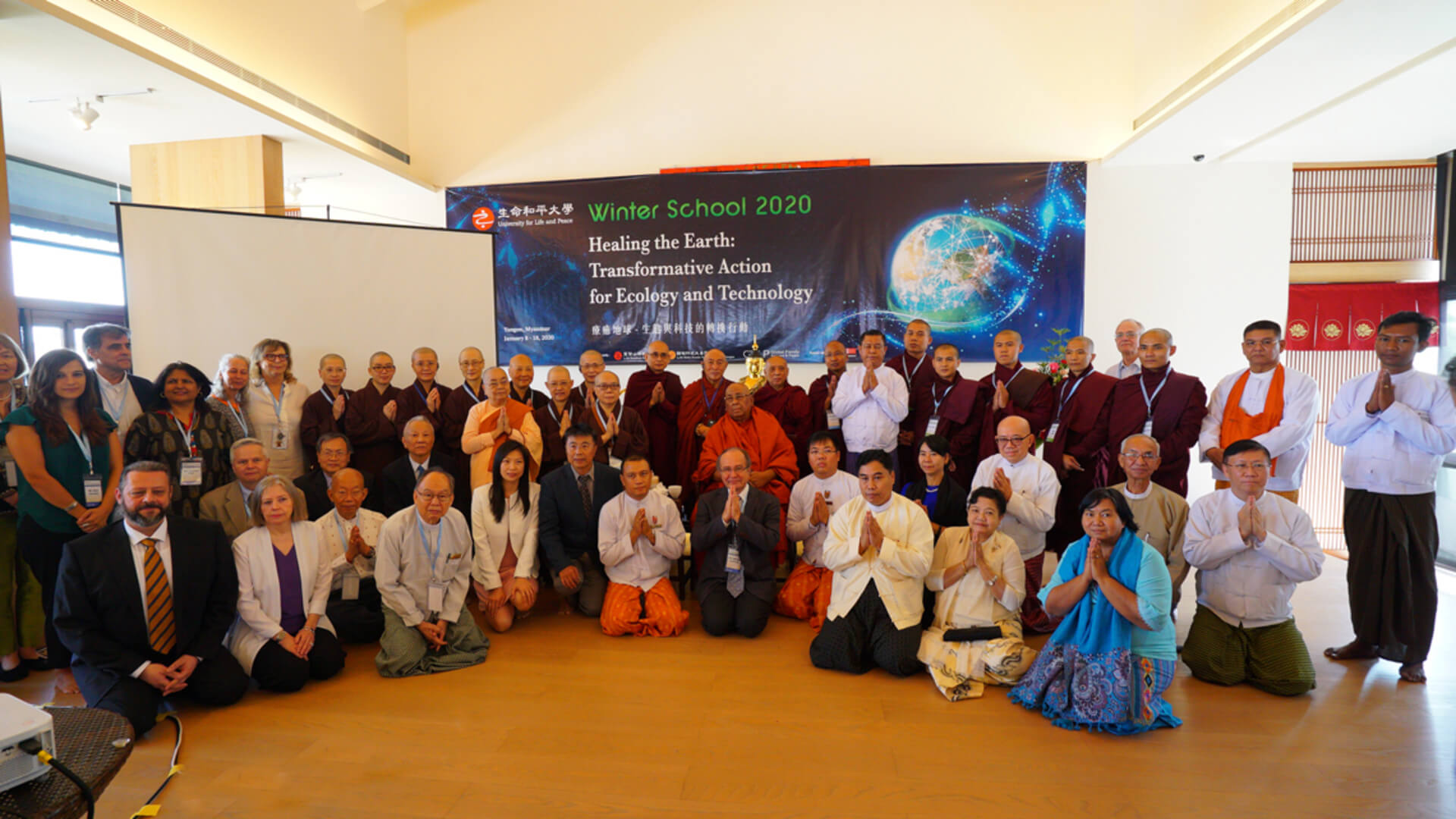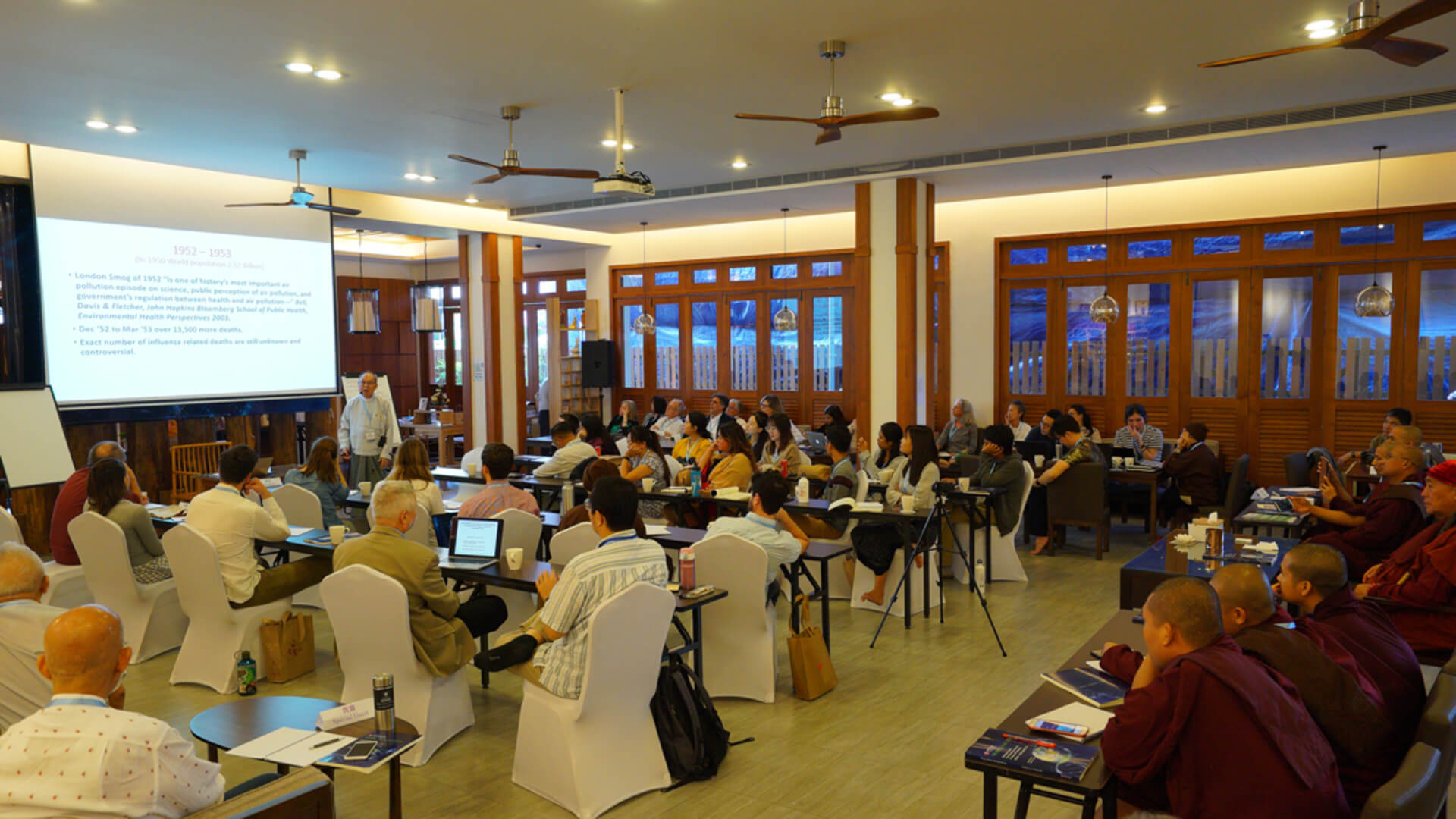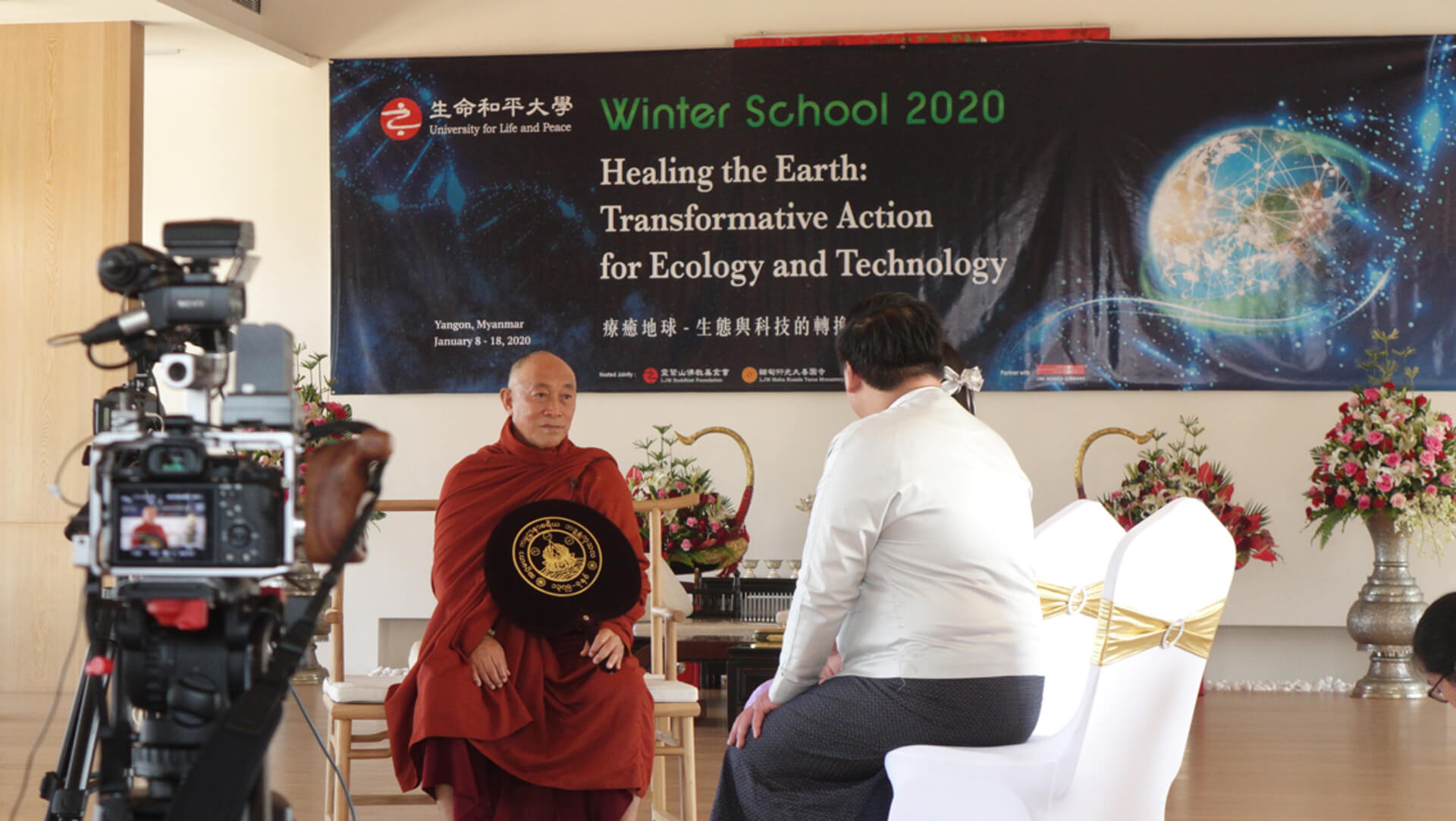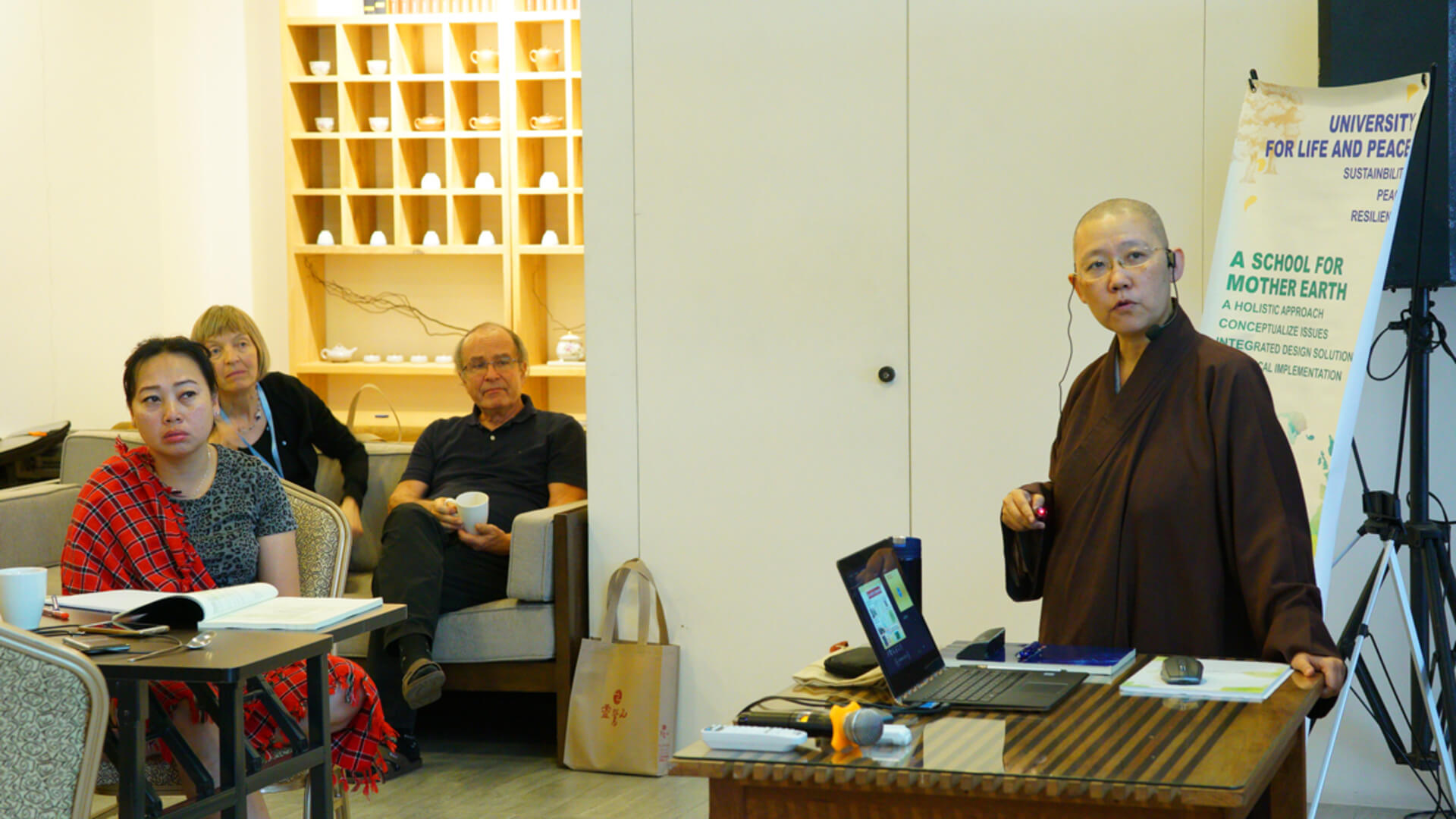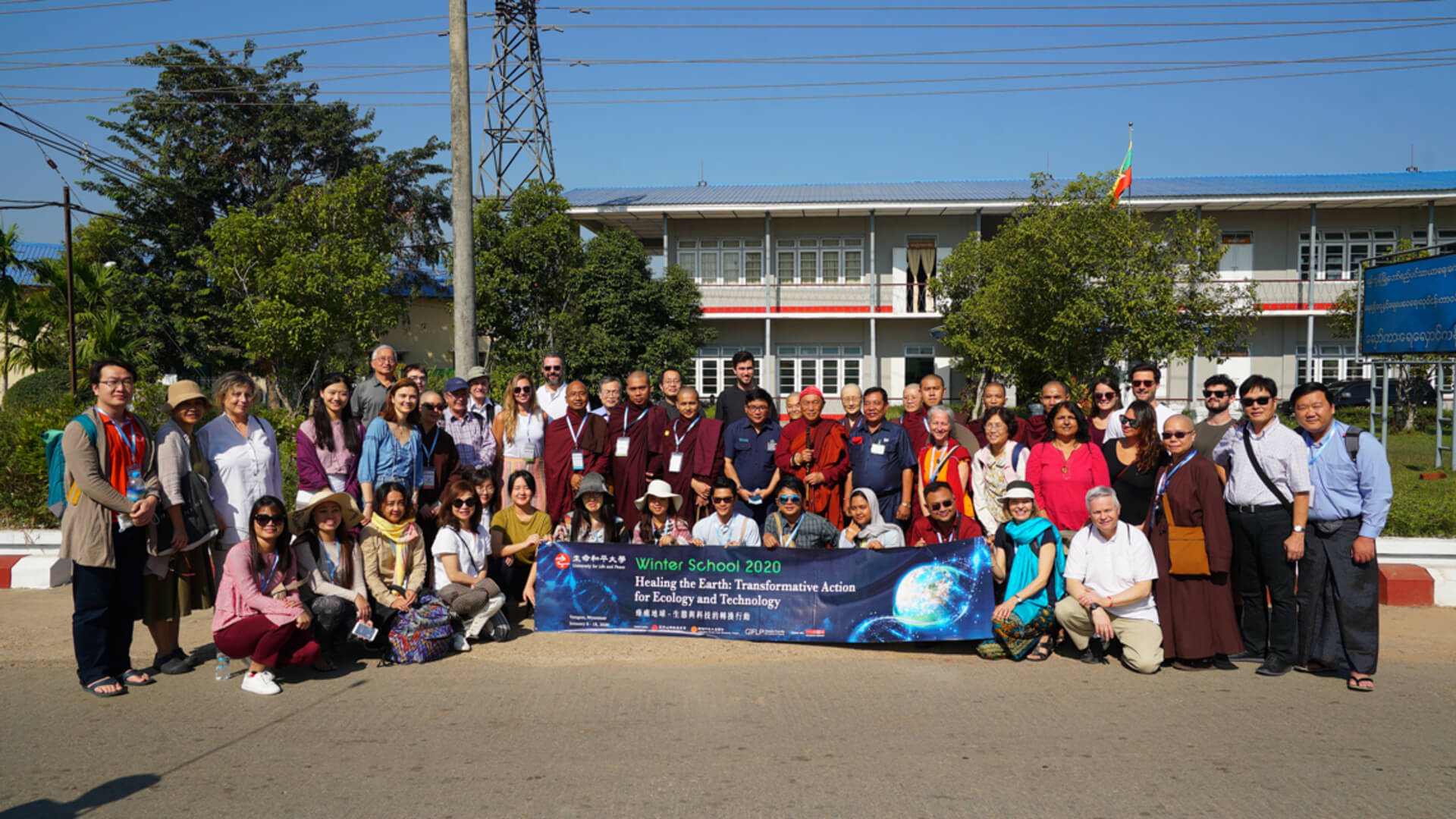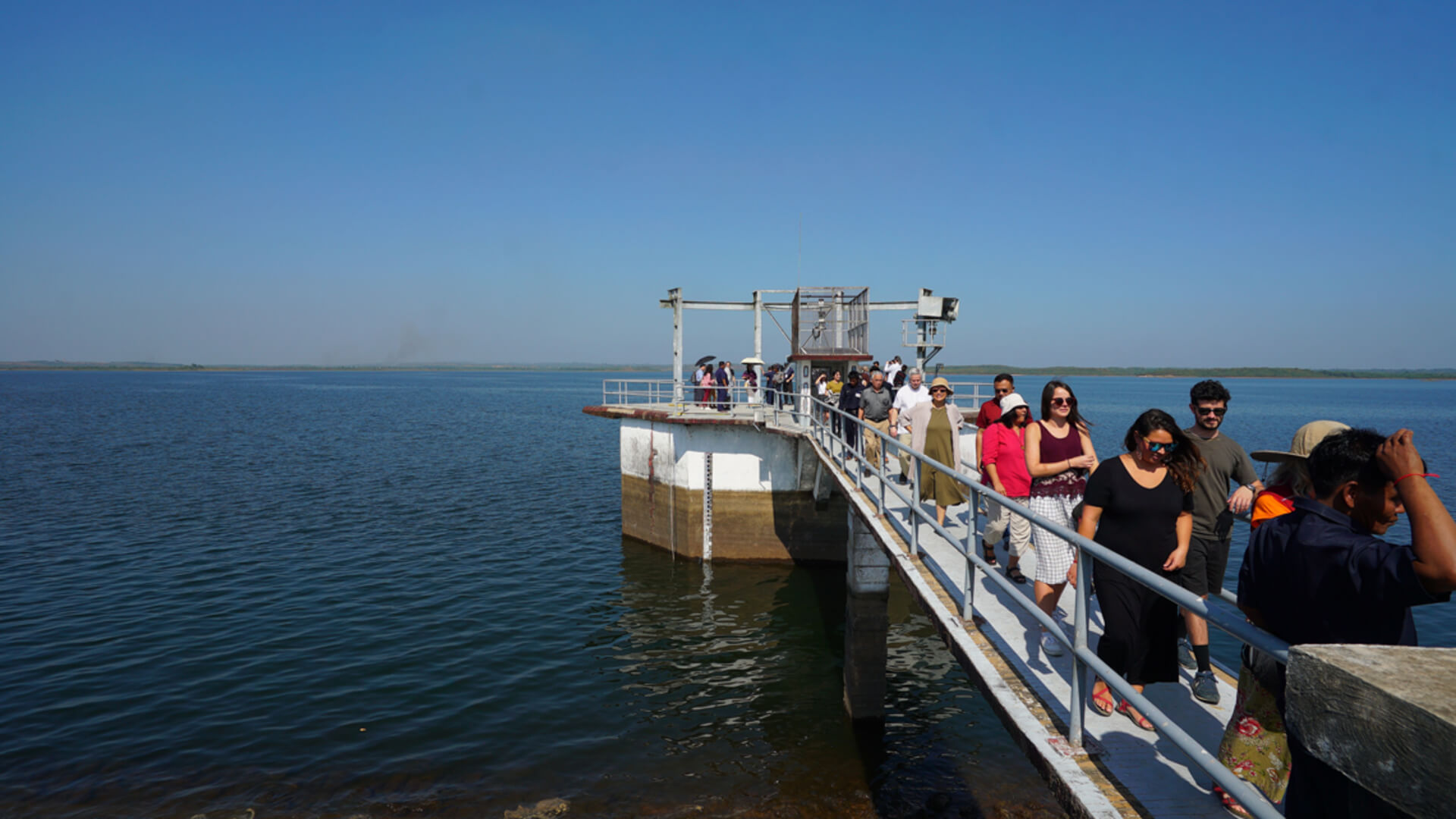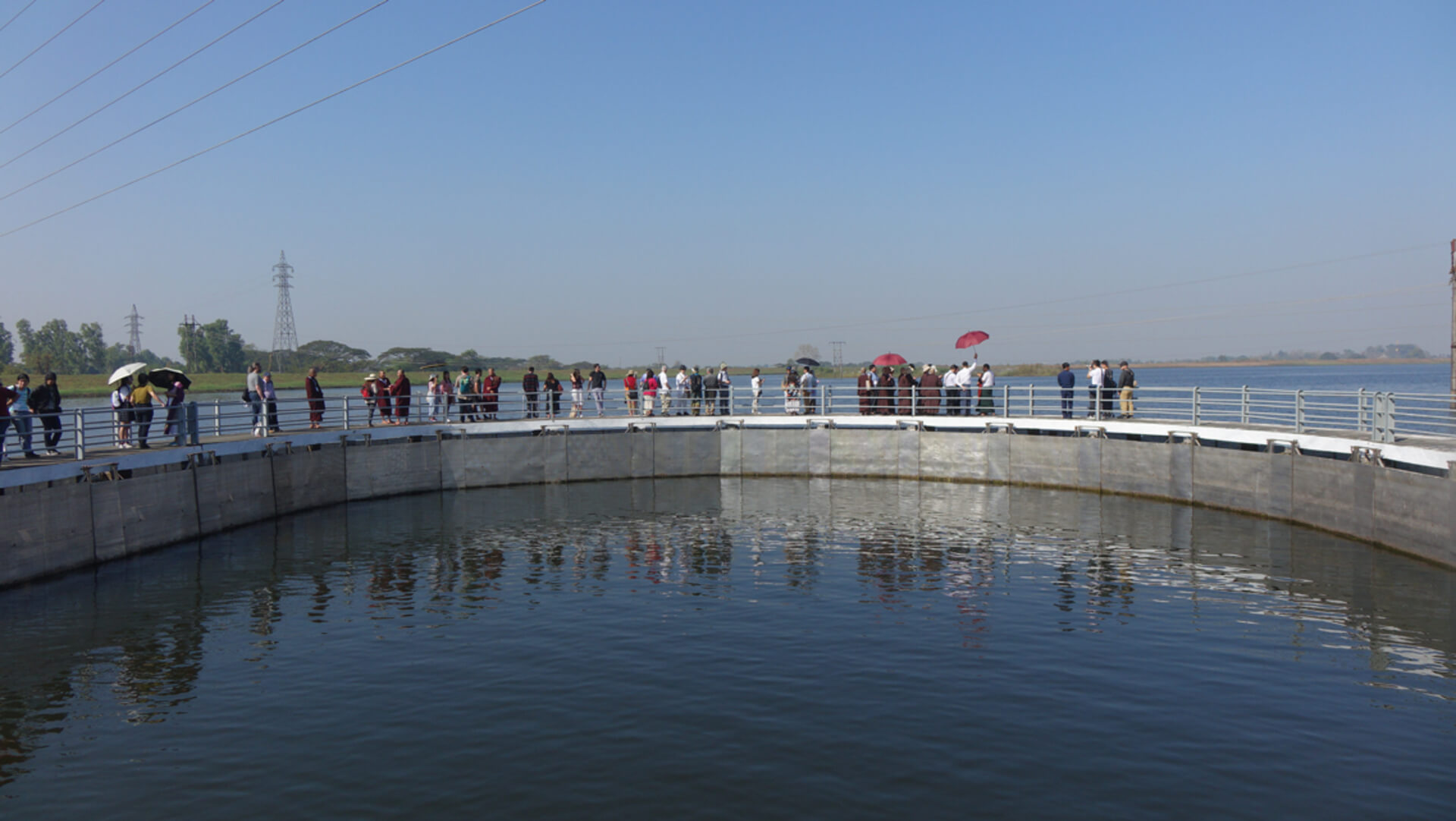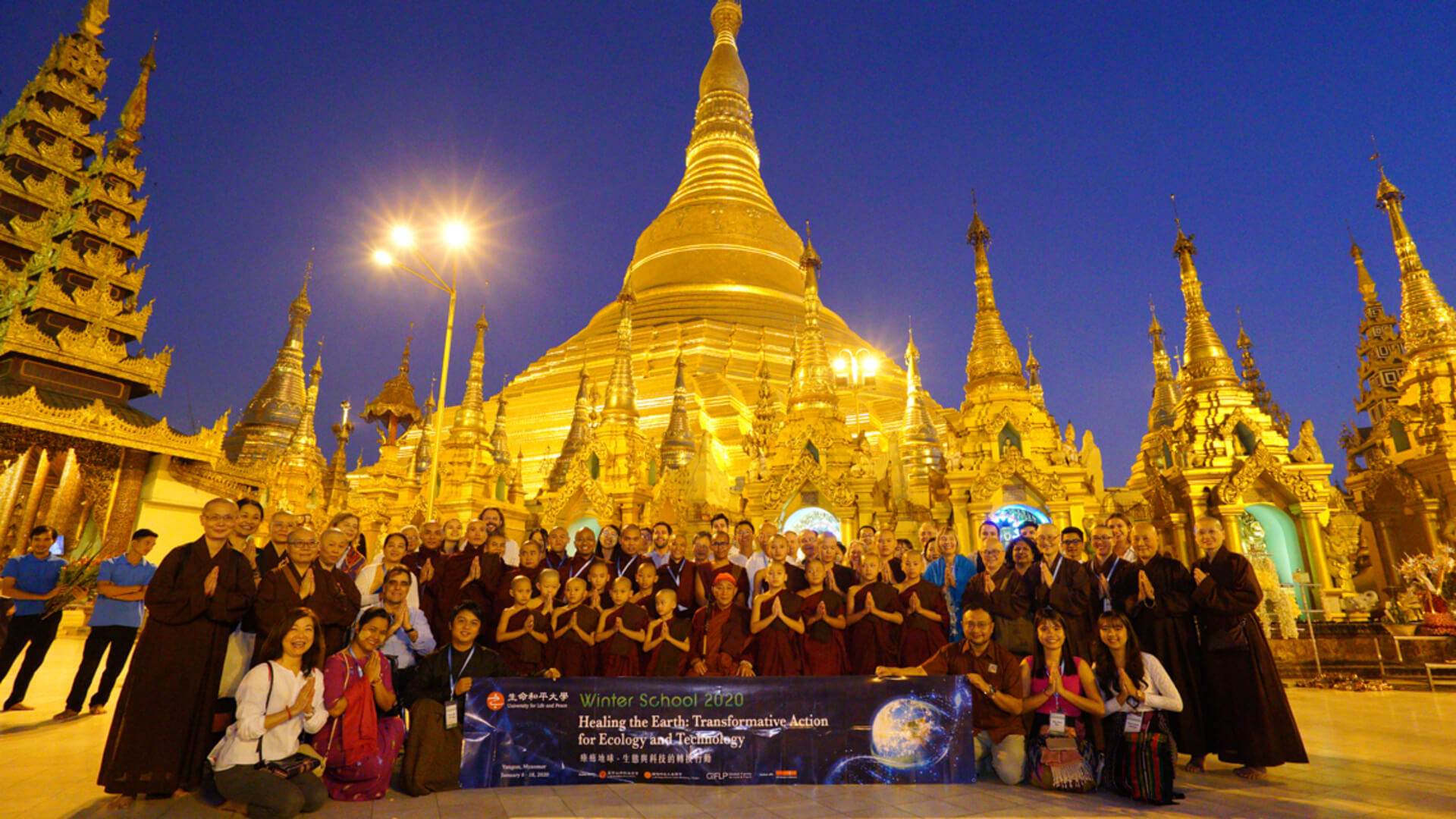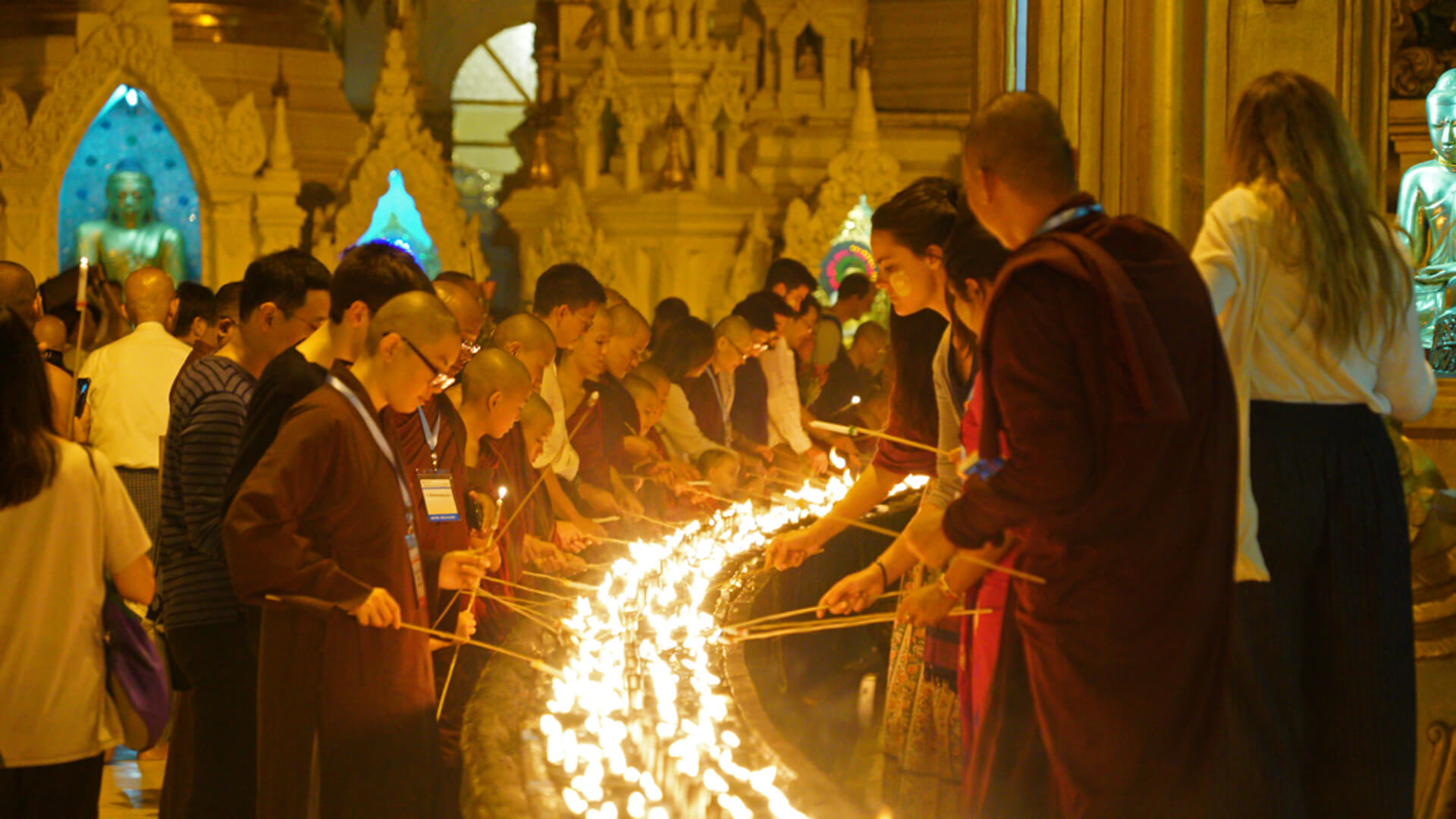Good day, respected professors, students, friends! Peace and blessings to you all!
The second year of the Ling Jiou Mountain Winter school, planned and prepared by the preparatory office of University for Life and Peace, is going to start soon in Yangon, Myanmar. On this occasion, I am very grateful to all supporters around the world who offered their contribution and support of this program. On behalf of all members in the preparatory team who have given their earnest efforts in making this possible, I would like to express my deep appreciation and gratitude to each and everyone of you.
The first winter school was conducted in January of this year 2019, with the theme of "Addressing Deep Roots of the Ecological crisis- Towards New Strategies." Ten world renowned professors were invited to offer their guidance and wisdom, offering lectures and leading discussion groups among students.Twenty-five students from various academic fields attended, and completed the course.
This first class had attracted much attention and received favorable responses in both Myanmar and in international academic sectors, in part due to its cross-disciplinary approach to research, which also included practical action plans. Professors and students continued their discussions and study for nearly six months after the class, resulting in a total of 15 approved and credited individual and group papers, granted with Achievement Certificates. With such a historical accomplishment, we have now indeed taken the first step toward the establishment of our university program.
We have now gained more confidence in moving forward, since a solid foundation has been built from this initial experience. After rethinking and re-examining today’s situation around the world, we carefully selected the theme for this year as "Healing the Earth–Transformative Action for Ecology and Technology". For the teaching faculty, we were able to again invite excellent professors from top universities. The criteria of selecting students included excellent professional knowledge, a sense of responsibility, and ambition.
This time, we are very pleased and honored to receive strong support from Yangon University, and the State Pariyatti Sasana University, and they will also send outstanding professors and students to attend our winter school. Thus, our efforts will have their impact on the local scene as well as in the international arena.
It is our firm belief that integrating both spirituality and technology into our work of healing the ecological system is a new and better educational model that will be beneficial to the Earth.
The ever-changing world situation is so unpredictable, human awareness keeps advancing along with the time. As such, shedding light on the root of our problems is the key to our search for solutions. Through the experience gained from the first year of the winter school, we are able to identify a clear and obvious strategic goal of our vision of education for peace. Therefore, the theme of this year "Healing the Earth–Transformative Action for Ecology and Technology," emphasizes the responsibility of technological applications to the eco-system by actively taking on beneficial practices and minimizing destructive ones.
We expect that through careful curriculum planning and a closely-knit interactive type of education that we are putting in place for this Winter School, new wisdom will be generated through mutual exchanges and resonance among participants.
We expect that this wisdom will address all aspects of human living and lead to rethinking and correction of current practices, resulting in action items that will entail a transformation in the way we think, speak, and do things vis-àvis our Earth.
In September of 2019, the United Nations Climate Summit was held in New York, and there, Michelle Bachelet, Former President of Chile sent out a warning that "climate crisis is the biggest threat to human beings in history, and no country, institute or decision maker shall sit on the sidelines and do nothing". She proposes five principles to promote climate action, and issues severe warnings to highlight the fact that the global climate crisis has come to the level of threatening our entire humanity and is now creating a human rights crisis. I deeply be lieve that the expertise from all of you can present further evidence or collective experience that will confirm what she has said.
This winter school research class is not intended just for a certain group of people to get together and have talks among themselves that result in nothing. We the participants must be confident in knowing that we are the seeds of peace, and that we are the among the pioneers of loving Earth. We must not only show courage in confronting our serious global problems together, but also lead the way to action that can forge through difficult situations.
Winter school is a part of a high-level research education, and although its scale is relatively small, it can be considered as a locomotive of the academic sector, and that it will have a major contribution to make to our common future.
Meanwhile, reporting on another aspect of our Ling Jiou Mountain Buddhist Society's work here in Myanmar, with the blessing of Buddha, the basic nurturing program provided by the Novice Buddhist Monastic School in Naungmon region has already accepted more than 400 novice Buddhist monks as of December of 2019. They are undertaking the traditional and strict Buddhist monastic education that will build a cornerstone for modern education. Furthermore, an organic eco-agricultural experiment program is being implemented in that region in order to create an advanced toxic-free organic farming and soil improvement technology.
The program has entered into an initial operation mode and has started to demonstrate some results. These are important facets of our task linked to the central program of the University for Life and Peace that is being prepared for by the Winter School.
The roadmap of the education program created by us in Myanmar has been comprehensively designed in a way that includes a graduate school in Yangon, a large piece of land in Bago area to be used as the site of the university in the future, a series of education programs provided in Naungmon which covers elementary school to junior college, including secular and religious sectors. The comprehensively integrated education program aims at a providing a vision of co-existence and co-prosperity on Earth, toward which we all aspire.
It will not only provide excellent resources for Myanmar, an ancient country that has been blessed with the heritage of Buddha for over a thousand years, on how to face the impact of modernization, but also offer clear guidance to the mainstream of society and to the technological sector, currently driven by materialistic values in pursuing a pattern of global development that has caused the ecological crisis.
If seeds of peace and awakening can grow from this program in a way that can direct technology in applying itself to ecological healing, this will certainly be good news for creating a sustainable way of life for the Earth. With the spiritual cultivation of compassion grounded on Confucian, Daoist, and Buddhist vision and practice, these seeds of peace and awakening can provide us with hope of advancing human civilization.
I am confident that our professional team of professors and consultants, selected from prestigious institutions all over the world, have in them such a mind of awakening, with many supporters around them who are more capable than I to see where the opportunities are.
A commitment to action is better than many beautiful words. Allow me to one more time sincerely invite everyone to join and share this movement of healing and loving Earth, and loving peace, regardless of place, time and form. Together we can plant the seeds of wisdom and compassion through human education that will thoroughly turn around the directions that will determine the fate of the Earth.
Dharma Master Hsin Tao
Founder, Ling Jiou Mountain Buddhist Society
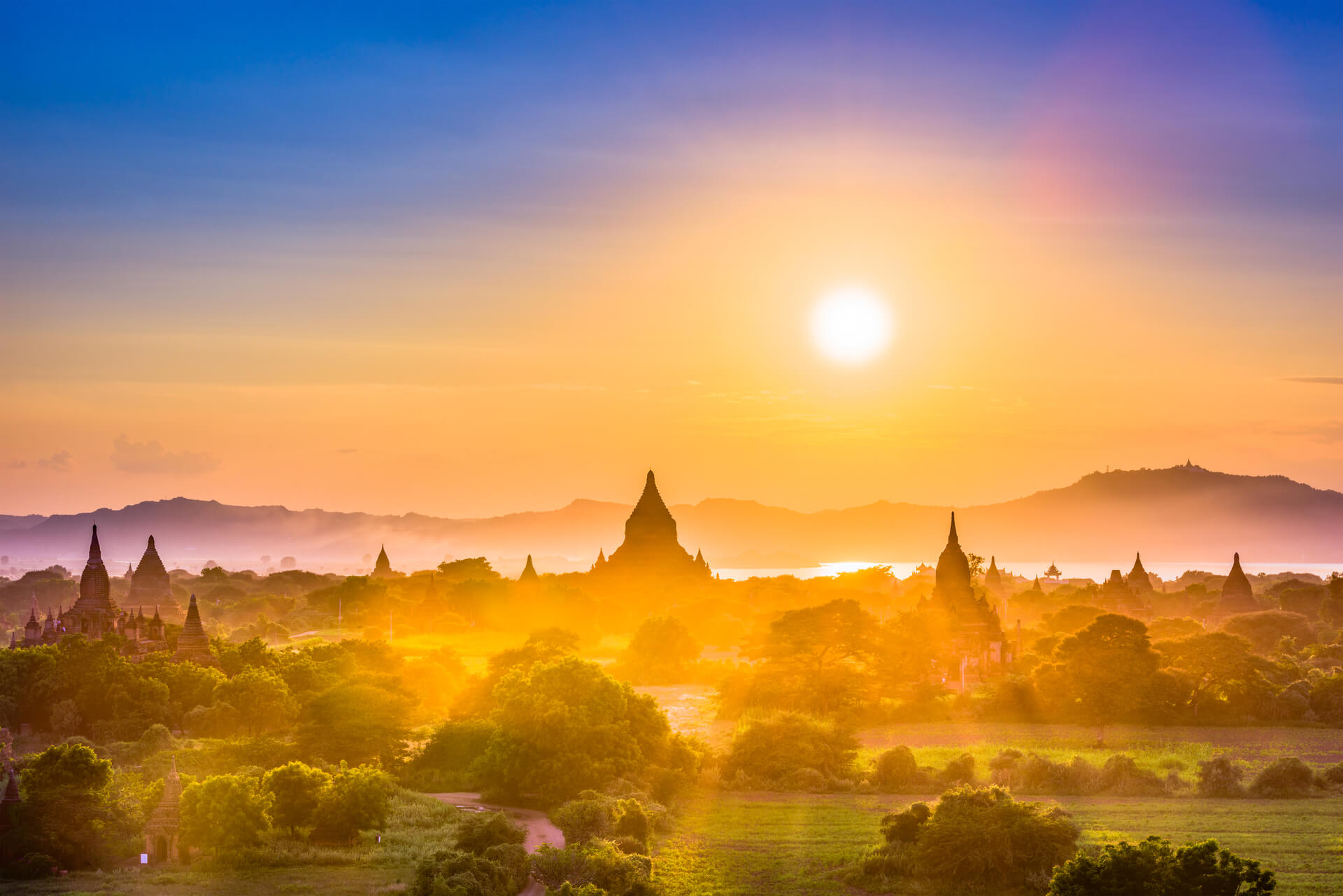
Winter School 2020
Winter School 2020 again attracts Global Attention
The Winter School program is a manifestation of synergy between the Ling Jiou Mountain (LJM) of Taiwan, the Human Science Center of Germany’s Ludwig Maxmillians University in Munich, and many other academic bodies the world over as a pilot project of the planned University for Life & Peace in Myanmar. Winter School 2019 saw the participation of 10 world-renowned professors and 25 students from various professional disciplines gather in Yangon, Myanmar to test-run a curriculum designed to drive thought-provoking and result-inducing interactions focused on the theme of 'New Strategies to combat Ecological Crises'. Local media in Myanmar took a keen interest in the pilot project, which was accredited by many academicians around the world as well.
The above-said curriculum ran for a span of two weeks, but interactions continued well beyond its wrap-up. The faculty and the student body carried on their in-depth discourses for a good half-year in spite of time-zone differences. A total of 15 reports by individuals as well as by groups passed scrutinies for awarded credit respectively. A historic chapter and a milestone of the future University for Life & Peace were thus achieved for its solid foundation.
Both the faculty and the student body of Winter School 2019 paid a visit to Dharma Master Hsin Tao as the founder of the future University for Life & Peace almost one year after the pilot project. Primarily they wanted to share what changes the Winter School program has brought into their lives one year after the fact. Joseph from Taiwan cherishes his experience of a spiritual awakening during the course of the program, but the time since has made it amply clear to him that the challenge comes in the form of an on-going effort to keep up the motivation for perseverance - such realizations by personal experiences are in effect part and parcel of the core value of the future University. On the other hand, Evgeny Parfenov and Elizaveta Parfenova from Russia have a word of advice to fellow students who are about to start their participation in Winter School 2020: vigilant mindfulness and a focus for every moment will be the key to fulfillment as the curriculum is both challenging and demanding.
The two-week curriculum of Winter School 2019 enticed self-studies, encouraged interactions and group discussions, as well as induced public sharing. Education with such an approach gives rise to changes from within, and group dynamics accelerate solution-finding and action-taking. Quite different from the tradition of one-way knowledge-sharing, the Winter School program puts more emphasis on the way to spiritual awakening and the global movement of facing up to ecological crises. Moreover, hopes are being pinned on the future University for Life & Peace as the true harbinger of awakened spirituality.
The theme of the curriculum for Winter School 2020 has been set to 'Healing the Earth - Transformative Action for Ecology and Technology' . Based on experiences with, and feedback from, the program the year before, the focus is now on how best to yield a positive overall impact on the ecology by putting technologies to work as referenced off best practices the world over. Venerable Master Hsin Tao is hopeful that Winter School 2020 will likewise generate positive energy of wisdom to benefit the Earth while contributing to actual action-taking.
The United Nations Summit on Climate Change issued in September 2019 a warning that 'the climate crisis is the most severe threat to mankind ever, that no countries, organizations, and decision-makers should just look on and do nothing.' The 16 years old environmental activist from Sweden, Greta Thunberg, also appealed to the effect that 'the world is being destroyed, people are suffering, and the ecological system is crumbling apart. If you are aware of all these and still fail to do anything about it, you are evil.' The appeal has a strong sense of urgency attached to its message of saving the Earth. The duty falls upon everyone, and it must no longer stay empty words. No one can entertain the notion any more that we as individuals matter little, if at all.
Education is one of Ling Jiou Mountain's main concerns and the emphasis on spirituality marks a unique feature of the Winter School program. Dharma Master Hsin Tao says that ‘What LJM is about is to benefit the Earth by triggering a positive cycle via the awakening of people's heart and mind through religion. We then hope to alter the magnetic field of the Earth by virtue of people's awakened spirituality for a means to help restore Nature. At LJM we aim at uniting spirituality and academics to ultimately establish game rules of interdependence and co-existence fit for the human society.' The creation of the University for Life & Peace is for yet a further concrete manifestation of the ideals of "Love & Peace", which rides on educative objectives of humanitarian care for lives and awakened spirituality via religious practice. The logic is clear: LJM works to awaken the world and the awareness of the crises can help curb the deteriorating climate change. Changes in people's lifestyles can literally help turn lives around. Here on its way out to you is our sincere invitation to join in our campaign of "Loving the Earth / Loving Peace" and sow the seeds of Love & Peace all over the world to enrich the Earth's soil for a co-existence and shared prosperity. Such is the LJM message for a sustainable symbiosis.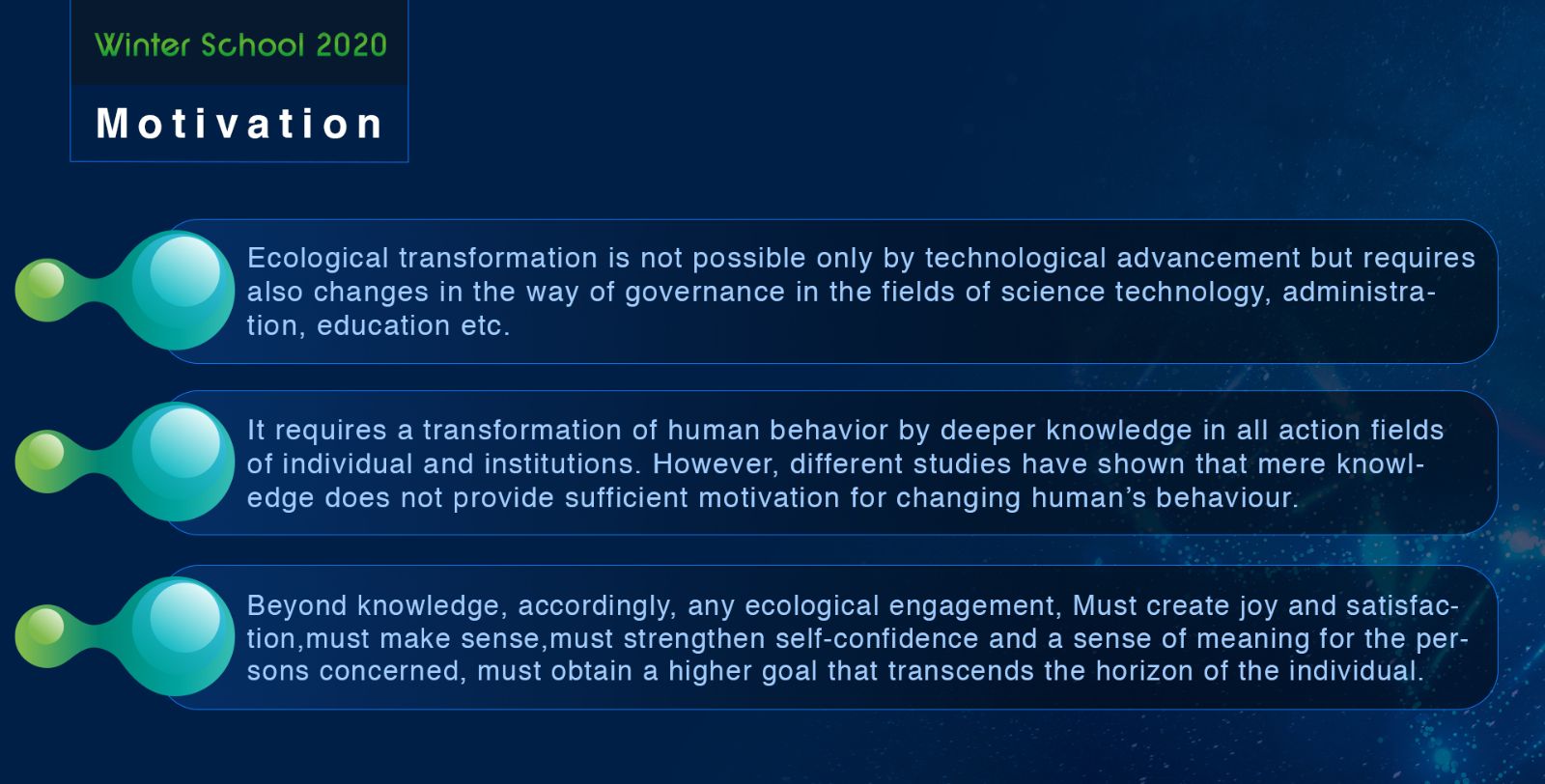
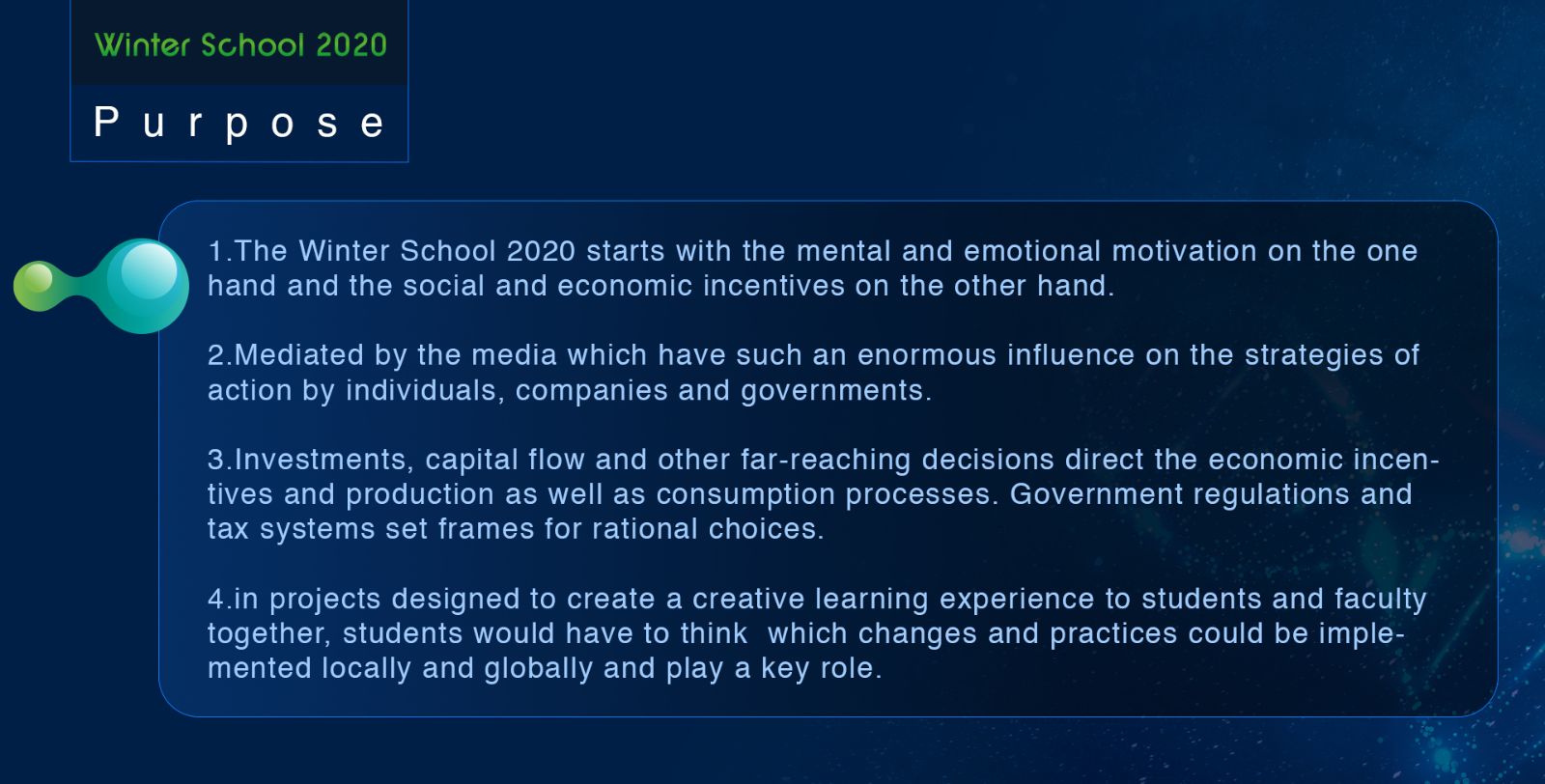
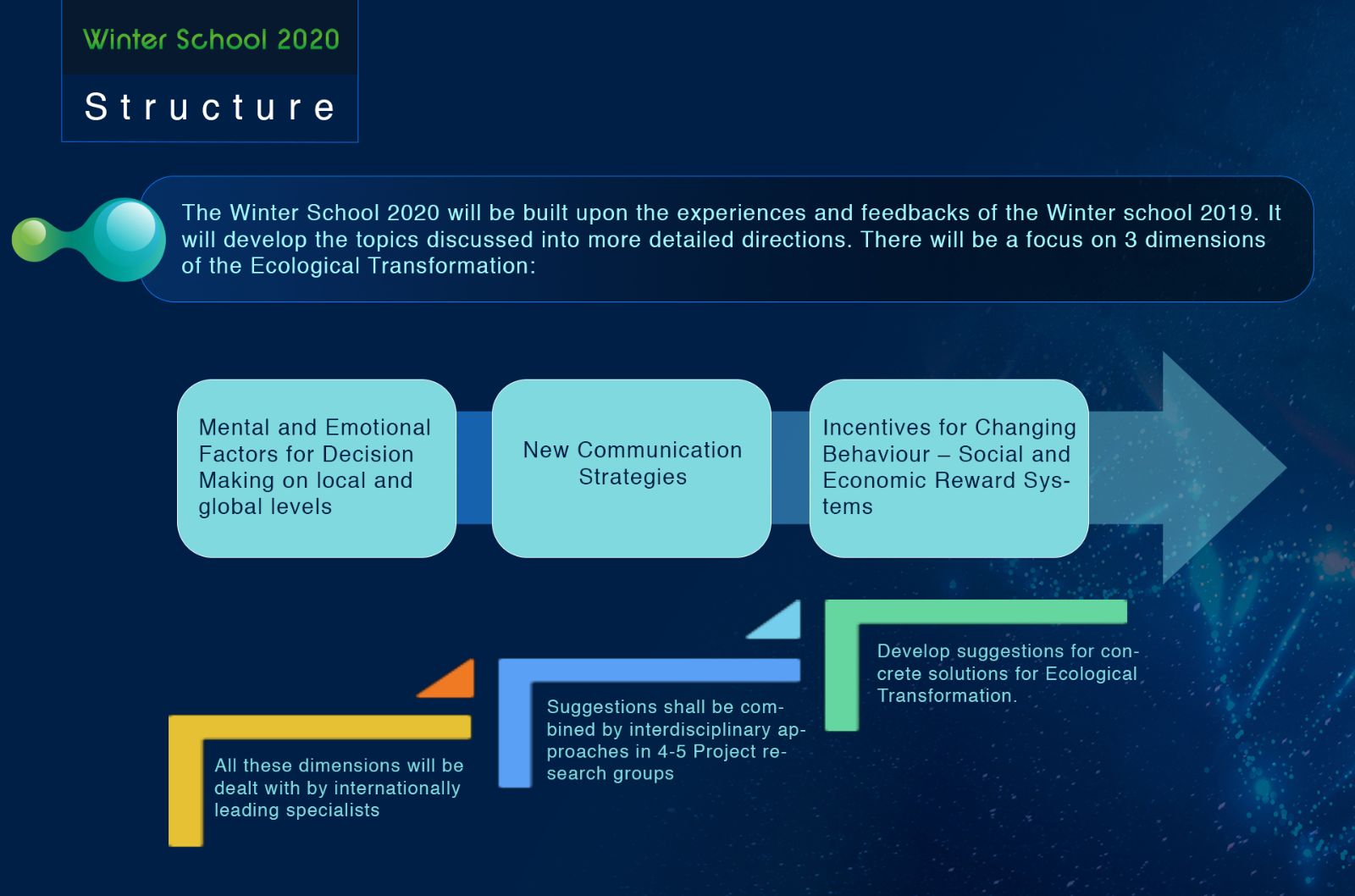
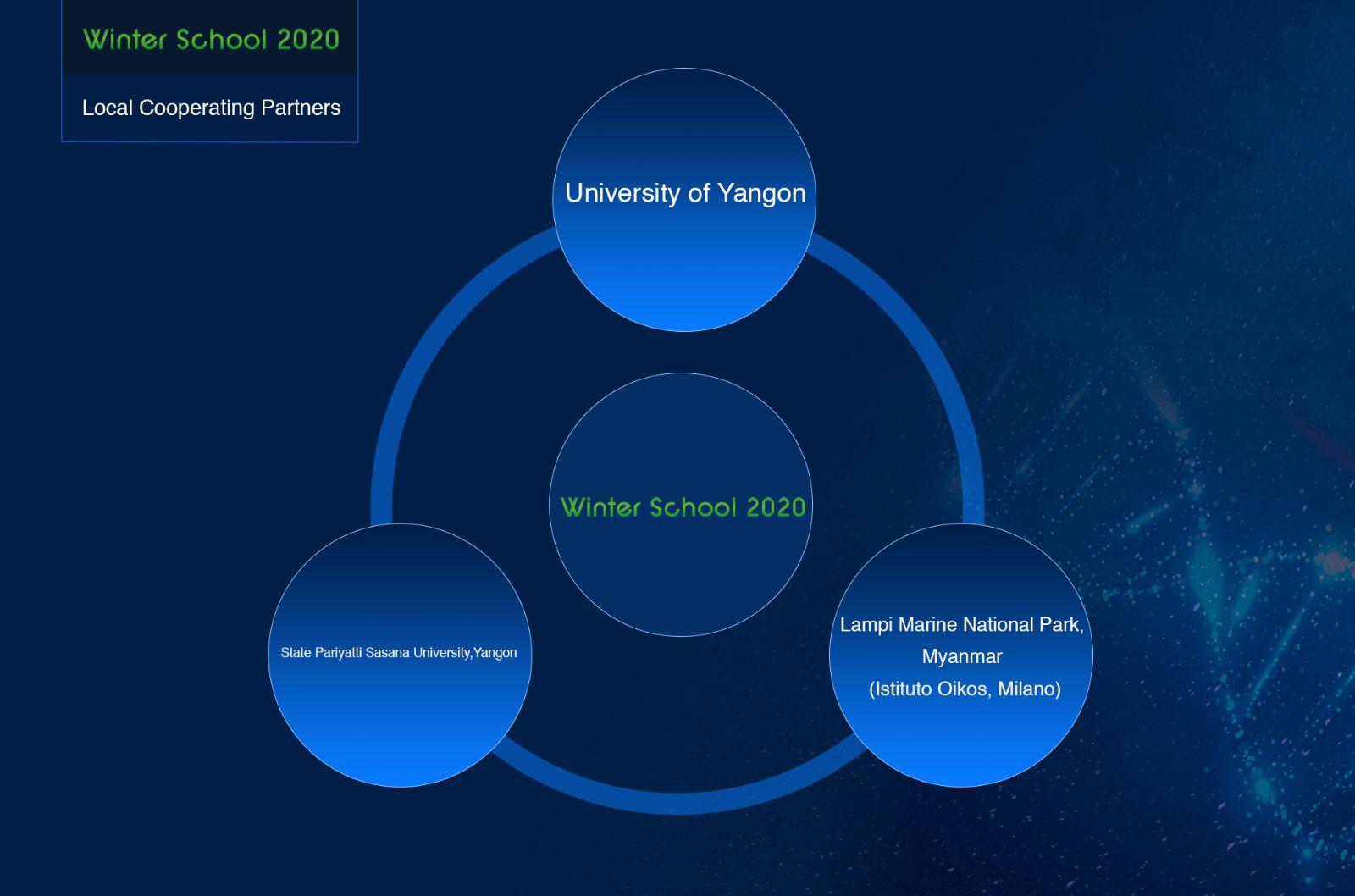
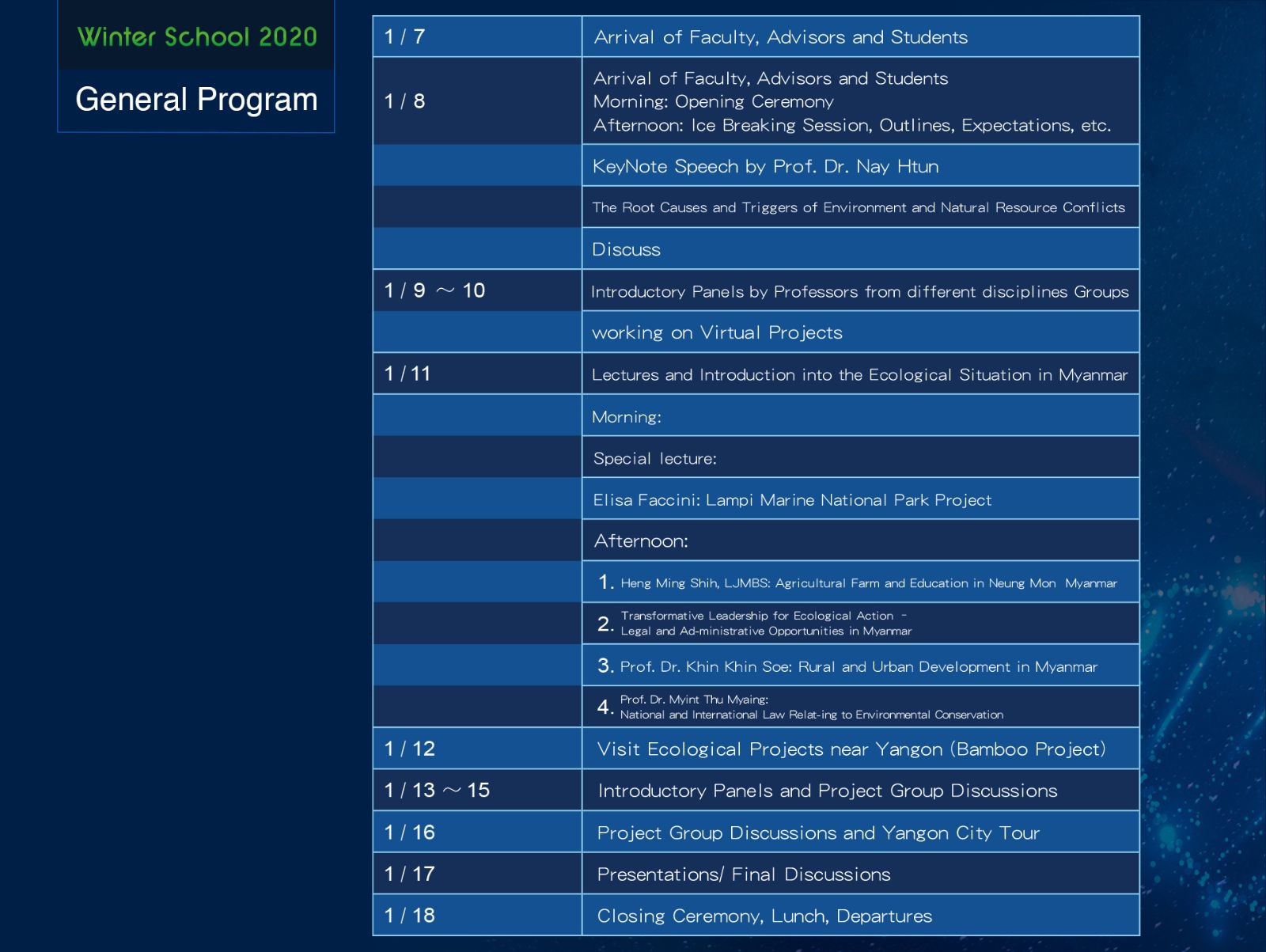
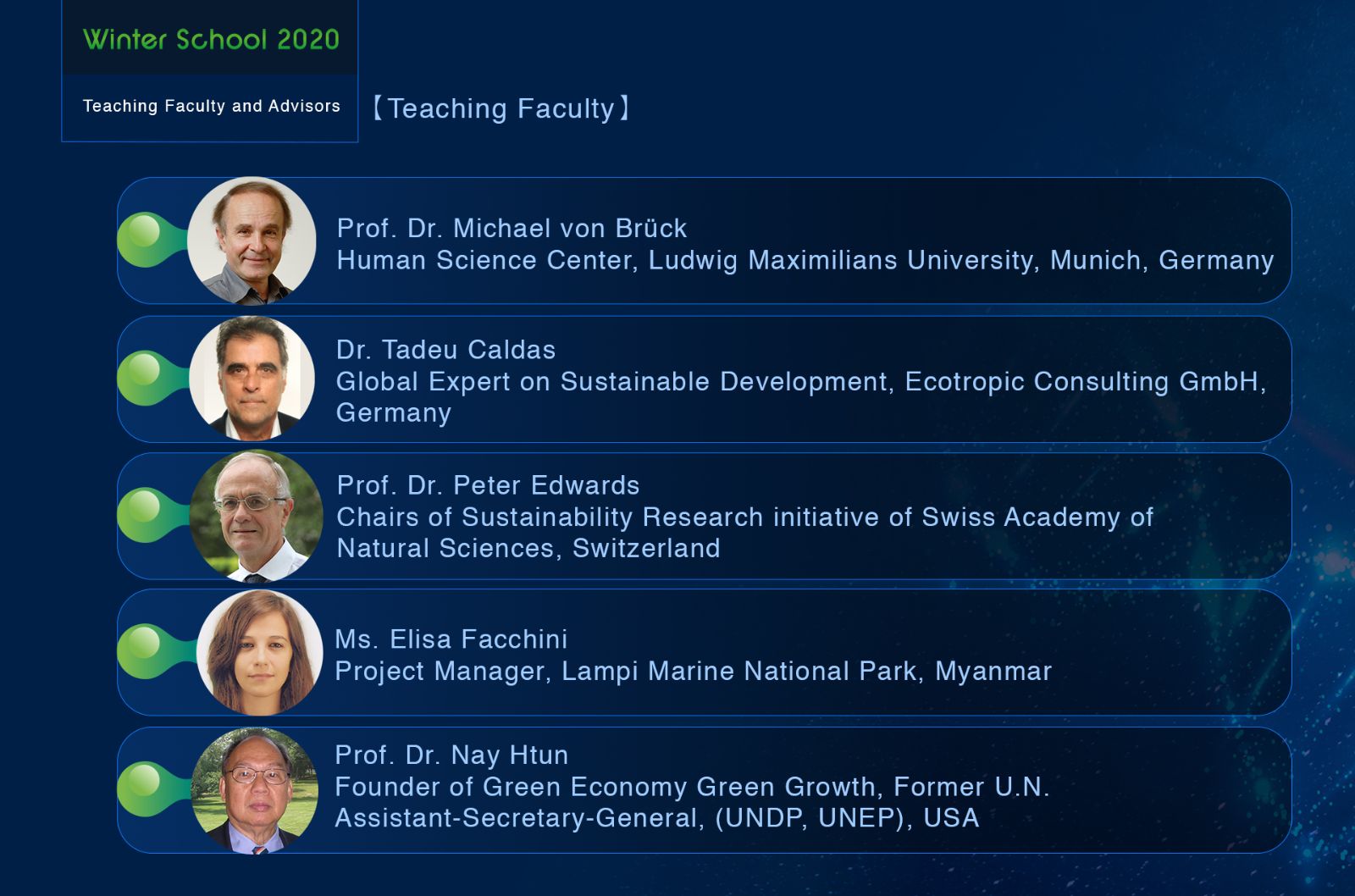
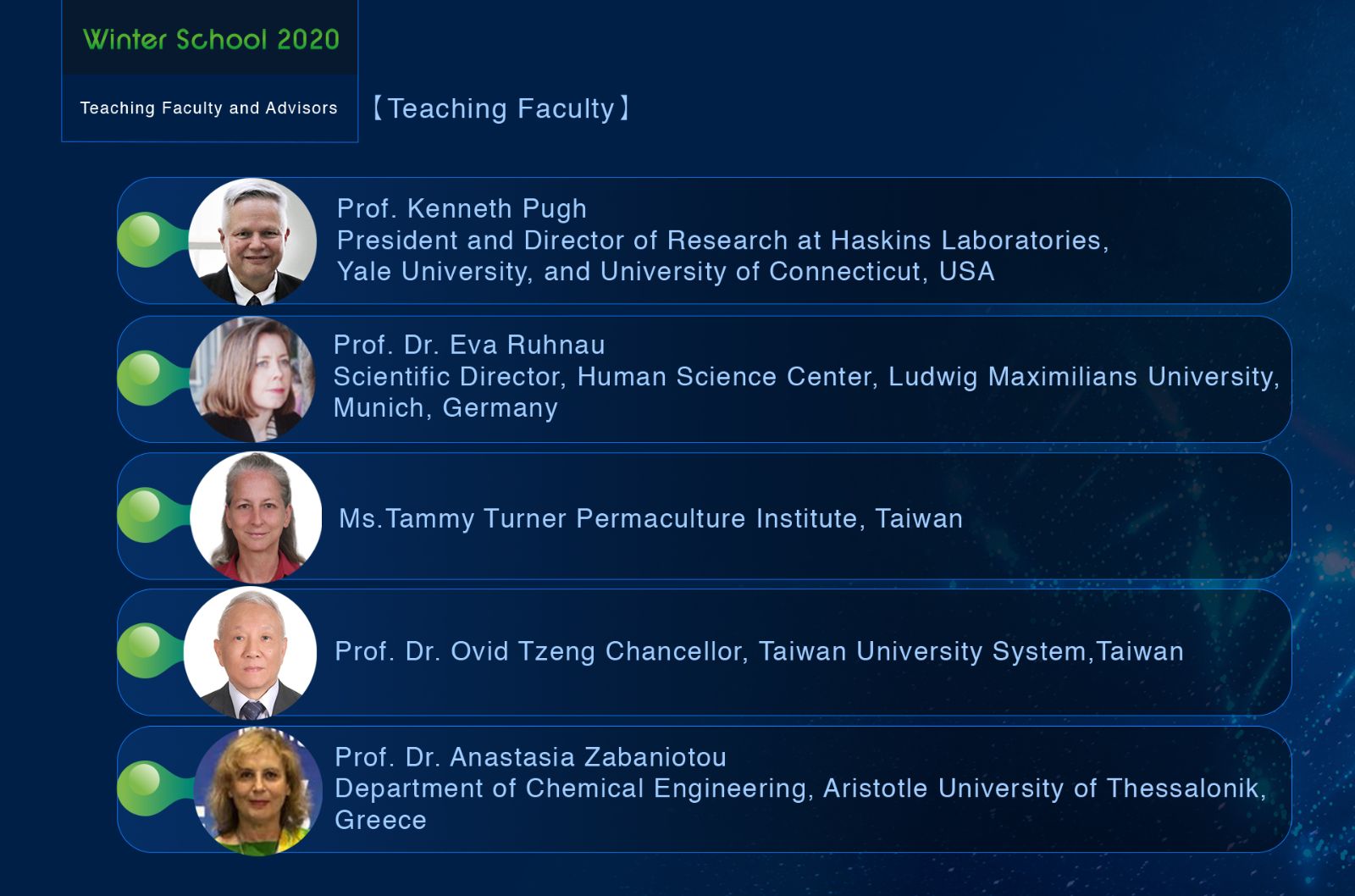
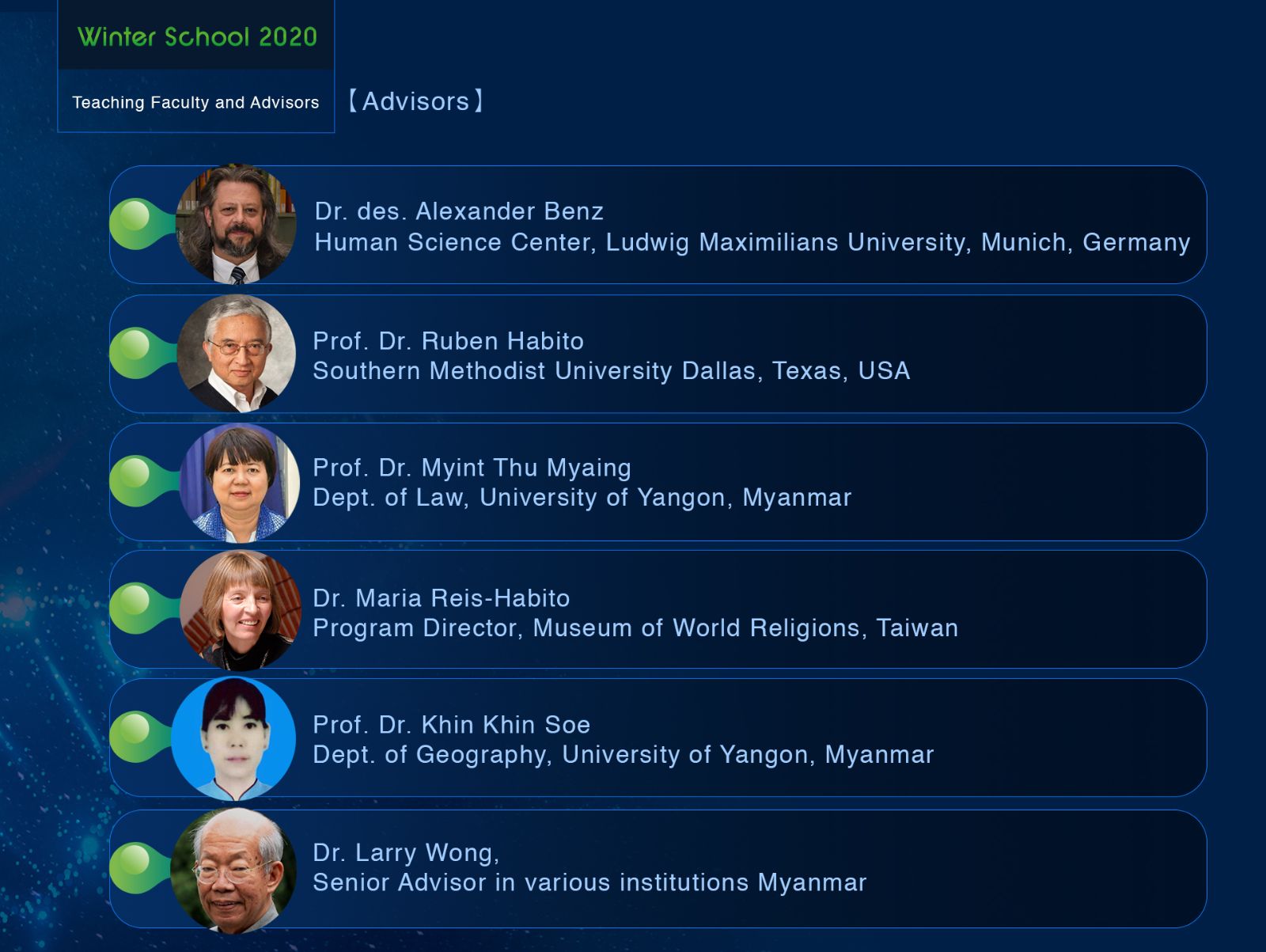
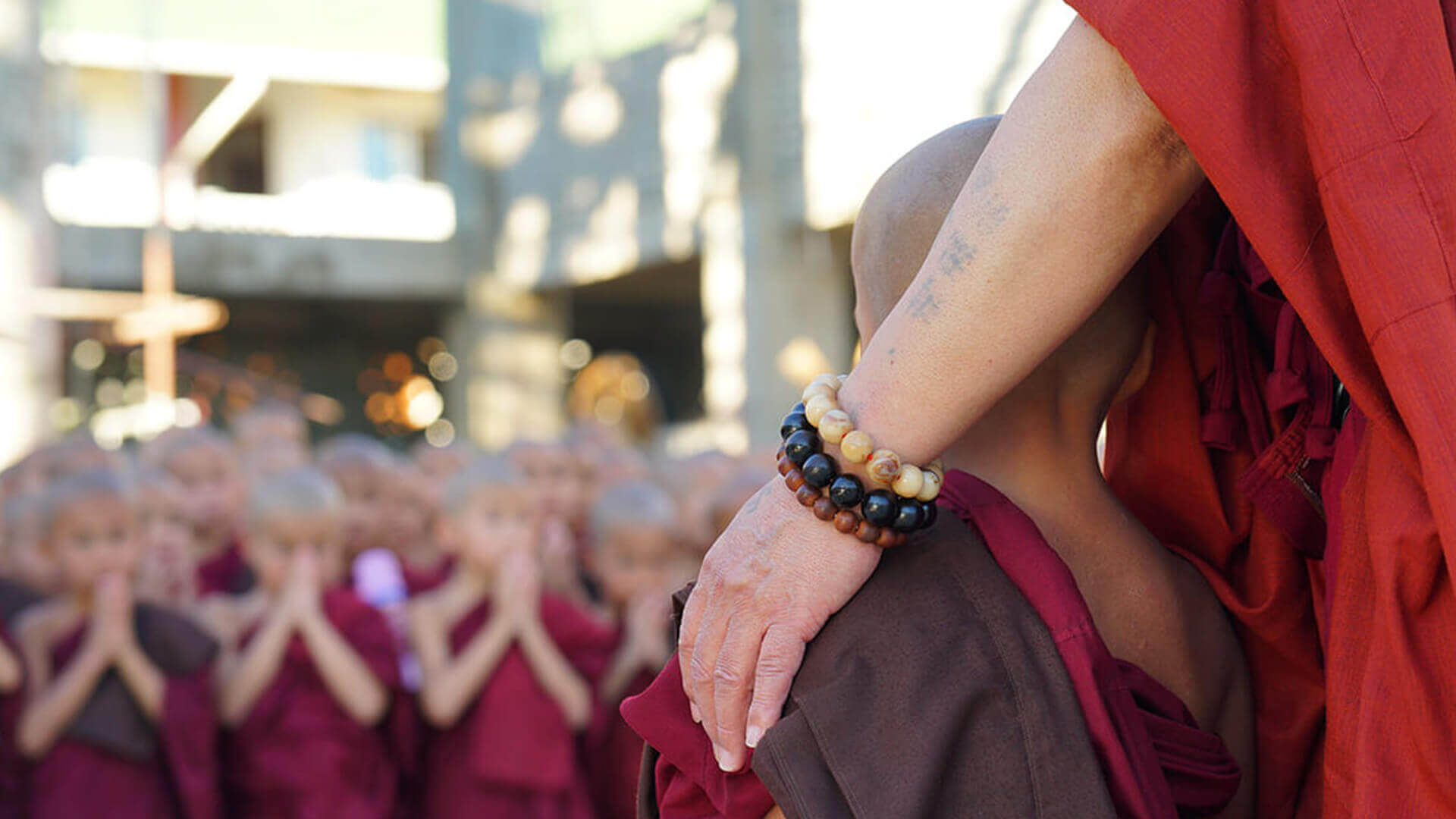
Turning Life around with Education:The Big Learning of Life & Peace from Childhood onward
Dharma Master Hsin Tao said that 'we (the Ling Jiou Mountain) aspire to create a world-class university of religion that can carry on the life education, revitalize a spiritual education, and assure deep rooting for social and cultural education. We aim at cultivating Buddhist missionaries while instilling collectively in our students a holistic ideal and religious care to help build a peaceful and harmonious life from within them individually.' As a result, the University for Life & Peace has begun to take up more definite shape in Burma as a gift to the country of Myanmar, a dedication to humanity, and a commitment to the world.
The forward-looking 'Experimental Winter School 2019 in Yangon, Myanmar' opened in January with a profound significance both in terms of time and place to mark a meaningful milestone for the materialization of the University for Life & Peace. That was by no means the first time that Dharma Master Hsin Tao made an educational endeavor, as 'to educate is to teach Buddha's ways' has forever been the core and essence of what the Venerable Hsin Tao Master strives to implement. War-orphaned and left in poverty growing up, the Master's personal childhood experiences made him acutely aware of how life is for the underprivileged. Our world would be missing out on a grand Chan master, had he not received help and support from kind-hearted people for an education otherwise.
Suppose life is a house, then education constitutes its pillars. The stronger the pillars are, the sturdier the house is. But in rural villages in remote northern Myanmar, life in general is too harsh to prioritize education for children over feeding them first. It is common for children there to encounter poverty, missing school education, child trafficking, abuse of substance, abduction to become child soldiers, etc. After a long and hard deliberation, education emerges as the last resort to help turn life around for the children there.
Thus came the Naung Mon Project into being in Lashio in northern Myanmar. The early phase of the Naung Mon Project for about a decade saw a focus on helping local farmers re-shape their economies by providing job opportunities to minority farmers, when the Project was run mainly as an eco-farm specializing in organic plantation that practices fair trade. The Project was an integrated, multi-purpose betterment plan to improve the quality of both life and education for the people to eventually overcome poverty by becoming economically self-reliant.
Construction for the campus began at Naung Mon in 2015 in the hope that a Buddhist education shall spread peace, with the support of other plans such as the improvement of soil and the transformation of staple food, the additional medical resources and services, as well as the introduction of the concept of 'Building Green' to decrease environmental impact and material waste for the ultimate purpose of constructing buildings that are environmental-friendly and conducive of sustainability. It was furthermore hoped that such ideals and know-how can be passed on to the local construction teams for lasting permeation through all local communities.
June 2016 saw the Sramana School of Maha Kusala Yama Monastery in Naung Mon begin to accept pupils who, besides acquiring the teachings of Buddha, would have a curriculum that abides by the standard prescribed by the Myanmar authorities. In order that the Sramanas would develop a multifaceted capability, the thematic learning of the Buddhist studies encoporates morning sessions, evening sessions, the Pali language, and general studies of the Dharma. Courses of basic education in language, mathematics, science, history, geography, etc., are conducted in Burmese, Chinese, and English. Group activities of PE, music, calligraphy, gardening, etc., are also built into the curriculum to enhance the pupils's grasp of group learning and community interaction. Bhikkhus will play life coaches to supervise their daily routine and help them grow into strict regimen required of practicing Buddhists.
The University for Life & Peace will be dedicated to the ideal of "Love & Peace" substantiated by 'Caring about Life for Humanity / Awakening Spirituality by Practice' for its educational objectives. The University has been designed to be a campus to materialize and construct a physical structure to manifest the global ethics of 'Respect, Tolerance, Love'. The Sramana School, on the other hand, shoulders the mission to root deeply and spread out widely to afford increasingly more children the opportunity to turn their life around. In so doing, the country Myanmar opens up herself to embrace the world and vice versa.
The progression of the University for Life & Peace, from the Sramana School at Naung Mon in 2016 to the Experimental Winter School in Yangon in 2019, is a journey of a series of Big Learning of Life & Peace from childhood onward. Besides marking a meaningful milestone, its significance lies in becoming a manifestation and a reminder that the world ought to become aware of deep roots of the Earth's crises, and to solidify our collective consciousness of "Loving the Earth" for actions to resolve root cause of our ecological crises. Everyone is cordially invited to join us and take that first step to jumpstart the power for changes and for awakening the spirituality. Come join us and build a University for the Earth’s safety and its sustainability.
Winter School 2020 again attracts Global Attention
The Winter School program is a manifestation of synergy between the Ling Jiou Mountain (LJM) of Taiwan, the Human Science Center of Germany’s Ludwig Maxmillians University in Munich, and many other academic bodies the world over as a pilot project of the planned University for Life & Peace in Myanmar. Winter School 2019 saw the participation of 10 world-renowned professors and 25 students from various professional disciplines gather in Yangon, Myanmar to test-run a curriculum designed to drive thought-provoking and result-inducing interactions focused on the theme of ‘New Strategies to combat Ecological Crises’. Local media in Myanmar took a keen interest in the pilot project, which was accredited by many academicians around the world as well.
The above-said curriculum ran for a span of two weeks, but interactions continued well beyond its wrap-up. The faculty and the student body carried on their in-depth discourses for a good half-year in spite of time-zone differences. A total of 15 reports by individuals as well as by groups passed scrutinies for awarded credit respectively. A historic chapter and a milestone of the future University for Life & Peace were thus achieved for its solid foundation.
Both the faculty and the student body of Winter School 2019 paid a visit to Dharma Master Hsin Tao as the founder of the future University for Life & Peace almost one year after the pilot project. Primarily they wanted to share what changes the Winter School program has brought into their lives one year after the fact. Joseph from Taiwan cherishes his experience of a spiritual awakening during the course of the program, but the time since has made it amply clear to him that the challenge comes in the form of an on-going effort to keep up the motivation for perseverance - such realizations by personal experiences are in effect part and parcel of the core value of the future University. On the other hand, Evgeny Parfenov and Elizaveta Parfenova from Russia have a word of advice to fellow students who are about to start their participation in Winter School 2020: vigilant mindfulness and a focus for every moment will be the key to fulfillment as the curriculum is both challenging and demanding.
The two-week curriculum of Winter School 2019 enticed self-studies, encouraged interactions and group discussions, as well as induced public sharing. Education with such an approach gives rise to changes from within, and group dynamics accelerate solution-finding and action-taking. Quite different from the tradition of one-way knowledge-sharing, the Winter School program puts more emphasis on the way to spiritual awakening and the global movement of facing up to ecological crises. Moreover, hopes are being pinned on the future University for Life & Peace as the true harbinger of awakened spirituality.
The theme of the curriculum for Winter School 2020 has been set to ‘Healing the Earth - Transformative Action for Ecology and Technology’. Based on experiences with, and feedback from, the program the year before, the focus is now on how best to yield a positive overall impact on the ecology by putting technologies to work as referenced off best practices the world over. Venerable Master Hsin Tao is hopeful that Winter School 2020 will likewise generate positive energy of wisdom to benefit the Earth while contributing to actual action-taking.
The United Nations Summit on Climate Change issued in September 2019 a warning that ‘the climate crisis is the most severe threat to mankind ever, that no countries, organizations, and decision-makers should just look on and do nothing.’ The 16 years old environmental activist from Sweden, Greta Thunberg, also appealed to the effect that ‘the world is being destroyed, people are suffering, and the ecological system is crumbling apart. If you are aware of all these and still fail to do anything about it, you are evil.’ The appeal has a strong sense of urgency attached to its message of saving the Earth. The duty falls upon everyone, and it must no longer stay empty words. No one can entertain the notion any more that we as individuals matter little, if at all.
Education is one of Ling Jiou Mountain’s main concerns and the emphasis on spirituality marks a unique feature of the Winter School program. Dharma Master Hsin Tao says that ‘What LJM is about is to benefit the Earth by triggering a positive cycle via the awakening of people’s heart and mind through religion. We then hope to alter the magnetic field of the Earth by virtue of people’s awakened spirituality for a means to help restore Nature. At LJM we aim at uniting spirituality and academics to ultimately establish game rules of interdependence and co-existence fit for the human society.’ The creation of the University for Life & Peace is for yet a further concrete manifestation of the ideals of ‘Love & Peace’, which rides on educative objectives of humanitarian care for lives and awakened spirituality via religious practice. The logic is clear: LJM works to awaken the world and the awareness of the crises can help curb the deteriorating climate change. Changes in people’s lifestyles can literally help turn lives around. Here on its way out to you is our sincere invitation to join in our campaign of ‘Loving the Earth / Loving Peace’ and sow the seeds of Love & Peace all over the world to enrich the Earth’s soil for a co-existence and shared prosperity. Such is the LJM message for a sustainable symbiosis.
► More Pictures
Sitagu Sayadaw gives full Support to University for Life & Peace
The 2nd experimental Winter School of the Ling Jiou Mountain (LJM) University for Life & Peace held its commencement ceremony on January 8, 2020, in Yangon Myanmar, attracting elites from all over to dedicate themselves to "Loving the Earth". Venerable Dr. Ashin Nyanissara, best known as Sitagu Sayadaw and founder and head of the Sitagu Buddhist Academies, personally graced the occasion and made a gift of a golden stupa for blessings. Winter School faculty and student body, together with all guests and visitors, also said special prayers for lives lost in the still-burning inferno of wildfires in Australia.
The auspicious occasion was attended by significant guests of honor to give their blessings, including Venerable Dr. Ashin Nyanissara 'Sitagu Sayadaw', Venerable Dr. Kumara 'Bhaddanta' (Rector of the State Pariyatti Sasana University),Venerable Dr. Therasabha, Assistant Professor of State Pariyatti Sasana University,Director U Sein Maw (Head of Yangon Region Religious Affairs, Department of Religious and Cultural Affairs, Myanmar), U Sein Maw, Director (Head of Yangon Region Religious Affairs) Department of Religious and Culture Affairs Myanmar, U Khin Maung Htun, Former Yangon Director of General, Dr. Myo Thet (Representative of the Taipei Trade Office of Myanmar),U Thein Win, Director of Ministry of Religious Affairs and Culture,Professor Daw Cho Cho Aung], Director of International Theravada Buddhist Missionary University and Senior Adviser of Ministry of Religious Affairs and Culture,. Devi Thant Sin, Founder of Global Green Group and Founder of Myanmar Green Network Prof Than Than Sein, Vice President, Myanmar Organic Association and U Thet Win, Senior Managing Director of Shwe Than Lwin Co., Ltd... etc. Dharma Master Hsin Tao invited everyone to join him in praying for the lives of all sentient beings lost in the Australian wildfires. Members of the faculty come from eight countries including the US, England, China, Myanmar, and Malaysia, whereas the student body consists of people from eleven internationally acclaimed universities such as Yale, Cambridge, the Beijing University, etc. Winter School 2020 aims at achieving plans on 'Transformative Actions of Ecology & Technology' via intensive studies in the short span of a fortnight. The Royal Music Band of Myanmar was on hand to dedicate a performance of blessing for a successful run-through of the two-week Winter School program.
Venerable Dr. Ashin Nyanissara 'Sitagu Sayadaw' expressed delight in attending the commencement ceremony of Winter School 2020. He pointed out that the theme of the program on 'Healing the Earth' is exactly right, in that Buddha also offered medicine to heal people as well as the world two-and-a-half millennia ago, which is Buddhism. Buddha's teachings spread out from India and everyone ought to learn from, and heed at, them as examples abound. Samadhi helps us focus on the present moment and we can practice it by way of meditation. Sila (Precepts) helps us remove wanton thoughts of greed/anger/ignorance to attain peace of mind and the University for Life & Peace is dedicated to that. Banyan (prajnaparamita or perfect wisdom) leads to the awareness of oneself and our original selves are immune from evil thoughts and worries. Sitagu Sayadaw said that he is happy that Dharma Master Hsin Tao has set out to do all these, as they both are borne out of the same root and they must cooperate to eradicate the Earth of her ailments.
Sitagu Sayadaw is very close to Dharma Master Hsin Tao as the founding abbot of the LJM Buddhist Society and has visited the LJM Wu Sheng Monasteries and the Museum of World Religions (WMR) with a still strong impression of the complete set of replicas in models to scale of religious monuments. What he saw in Naung Mon as to Dharma Master Hsin Tao's commitment to local development in education as well as in ecological conservation moved him so much so that upon learning that the Maha Kusala Yama Monastery will build a golden stupa, Sitagu Sayadaw generously committed to making it a gift of donation of his. A ceremony for the donation coincided with the auspicious occasion of the opening of Winter School 2020.
Venerable Dr. Kumara 'Bhaddanta', Rector of the State Pariyatti Sasana University, pointed out that there is a saying in the Pali language that knowledge and wisdom are treasures of mankind. Winter School 2020 features many professionally acclaimed academicians to teach and pass on the essence of their expertise to benefit all involved. It is sincerely hoped that the students would participate with undivided attention to learn and master what is shared, so that they, too, become future treasures of Myanmar and of the world.
The movie "Awakening Action" shown at the commencement indicates that the Earth is on a course of destruction and only actions of awakening could help halt and curb the climate change crises. A saddened Dharma Master Hsin Tao said that the run-away disaster of the Australian wildfires has already destroyed an area the size of Denmark or that of Hong Kong times 45, and is equivalent to a 4-to-5-fold of the Amazon wildfires of 2019. What is there left for us to do? He further stressed that it belongs to the LJM mission to achieve interfaith cooperation of environmental protection, and only when the LJM ideal of 'Loving the Earth' becomes a truly global campaign that it will prove helpful to the ecology.
While expressing genuine appreciation for all the world's support to the University for Life & Peace project, Dharma Master Hsin Tao pointed to the Winter School 2020 theme of 'Healing the Earth - A Transformative Action of Ecology & Technology' to emphasize the goal of making more positive application of technologies to benefit our planet. It is his hope that the program's expertly designed curriculum with a built-in mechanism for interactive education will optimize the resonance of wisdom induced from within and between the faculty and the student body. It is furthermore hoped that such a gyrating resonance will ignite action plans to trigger worldwide reflections of self-examination, modifications, and ultimately changes of people's habits and lifestyles for the better and in the best interest of sustainable ecology.
Professor Michael von Brueck,head of academic development of ULP, in charge of the future University's Board of International Advisors referred to the 'Fridays for Future' movement promoted by the Swedish environmental activist Greta Thunberg as attracting the following of many of the Y and the Z generations, plus support by many scientists. He said that also highlights the fact that a lot more needs yet to be done for ecology, and there is the need to come up with a viable solution to environmental issues. We must achieve a workable and constructive strategy that guides our teaching, hands-on learning, meditation, and practice of mindfulness. We do not make the effort for just the elites as a fraction of the population, but we endeavor together for the humankind collectively.
Dharma Master Hsin Tao said in closing that the Winter School program is a link to higher education and as such, it is admittedly not big in scale but possesses immense forward-looking value. Dharma Master further cordially invites everyone to join in the healing action of 'Loving the Earth / Loving Peace', by injecting genes of wisdom and compassion into people's education towards the ultimate goal of changing the fate of the world for our life communities.
► Open Ceremony Pictures
United Nations Expert issues dire Warning against deteriorating Ecology
The future University for Life & Peace held a Commencement Ceremony for its Winter School 2020 on January 8 and featured a keynote speech by Professor Nay Htun, Honorary Patron & Founder of GEGG Myanmar (Green Economy Green Growth), and former UN Assistant Secretary-General at UNEP and UNDP. GEGG has been organizing a number of significant forums over the past decade to explore themes on all things Green, sustainable development, regenerative capacities, etc.
Professor Nay Htun opened his keynote with two weighing quotes - 'People ignorant of history will be punished by the past' / 'Your tomorrow is decided by what is being done today' - to appeal for people's serious attention to our deteriorating ecology. Throughout mankind's civilizations from the past over the present into the future, limited natural resources like land, rivers, water, and forestry have forever been accessed and exploited excessively that inevitably accounts for our severely damaged ecology. Human history has since long revealed that fair and inclusive access to natural resources is always critical to mitigating disputes and wars. Professor Nay Htun further said that as early as some 2.5 millennia ago Buddha himself already discourse about the essence of an inter-reliant symbiosis, in that 'one must respect all forms of life'.
Dharma Master Hsin Tao, Ling Jiou Mountain (LJM) Founding Abbot, says that ecology has its roots in spirituality and life is the extension of the memory matrix. All things are inter-related and -dependent, and things impact one another in a diverse symbiosis, with none in the position of independent and stand-alone existence. The insight and the train of thought shared by Professor Nay Htun lend themselves well as explanatory remarks to Dharma Master Hsin Tao's philosophy.
Professor Nay Htun is of the opinion that Natural Laws dictate the protection of resources of water and air that belong to all people, and Nature fights back when ecology suffers excessive abuses. Watershed cases in point include the Great Smog of 1952 in London that killed more than 4,000 people and prompted the British Government to legislate the 'Clean Air Law' in 1956. That very same year 1956 also witnessed quicksilver poisoning in Japan's Kumamoto Prefecture, rendering patients impaired in motor motions, hearing, speech, dementia, etc.that could progress to bouts of spasm, even deaths. The Minamata Disease remains without cure even today.
It was around that time in the late '60s when quite a few books on the environment became best-sellers to catch people's attention to public health issues. International limelight soon followed with consequent burgeoning actions. An environmental science book 'Silent Spring' by author Rachel Carson in 1962 took the world by storm with that arresting title alone - excessive use of chemical pesticides inflicted severe damages to ecology that Spring went silent with no bees and birds to usher in a new cycle of the year or life in general at that.
Marine biologists were not alone in becoming concerned with the environment, as Dharma Master Hsin Tao has also been proactive in environmental issues for quite some time over the years. His consistent contributions over decades to the CPWR - the Council for a Parliament of the World's Religions - suffice to illustrate. At the 3rd CPWR in 1999, Dharma Master Hsin Tao delivered a keynote on paying respect to the universal environment without exploiting the Earth's resources excessively. At the 4th CPWR in 2004, he spoke about his cosmic view on biology in search of a sacred root for the world’s inter-reliant co-existence. The 5th CPWR in 2009 saw the Master deliver an appeal for world peace and harmony that demand environmental protection policies as a prerequisite as well as putting an end to the insatiable human greed. Then the 6th CPWR in 2015 was when the Venerable Master argued that meditation can help transcend people's state of mind and that Life & Peace is the core of a diversified symbiosis. The 7th CPWR in 2018 was when the Master shared insight in global ethics of ecology as to be manifested by the University for Life & Peace project. In parallel to the CPWR and in 2019, the first Winter School of the future University for Life & Peace debuted in Yangon Myanmar as a pilot project. Winter School 2020 is set to transform consensus into action and run on the theme of "Healing the Earth: A Transformative Action of Ecology & Technology" with a faculty comprising of experts from 8 countries like the US, England, China, Myanmar, Malaysia, etc., and the student body made up by elites from 11 world-renowned campuses like Yale, Cambridge, the University of Beijing, etc. The Winter School 2020 program aims to achieve workable strategies for transformative actions that interloop ecology and technology in the course of a fortnight.
The Winter School 2020's topical theme of "healing the Earth" also echoes Professor Nay Htun's working experiences at the UN. The highlight of his tenure of more than 20 years at the global body was action-taking besides promoting theories and contributing professionalism. That the UN declared June 5 'the World Environment Day' is evidence and proof that the world is urged to take the issue of environmental protection seriously and actual actions are called for indeed.
In closing, Professor Nay Htun shared with the audience this heartfelt statement - 'Let us care for our common home, the Earth, with happiness, sharing, tolerance, and compassion. Future generations rely on what you do today, not tomorrow.'
► Pictures
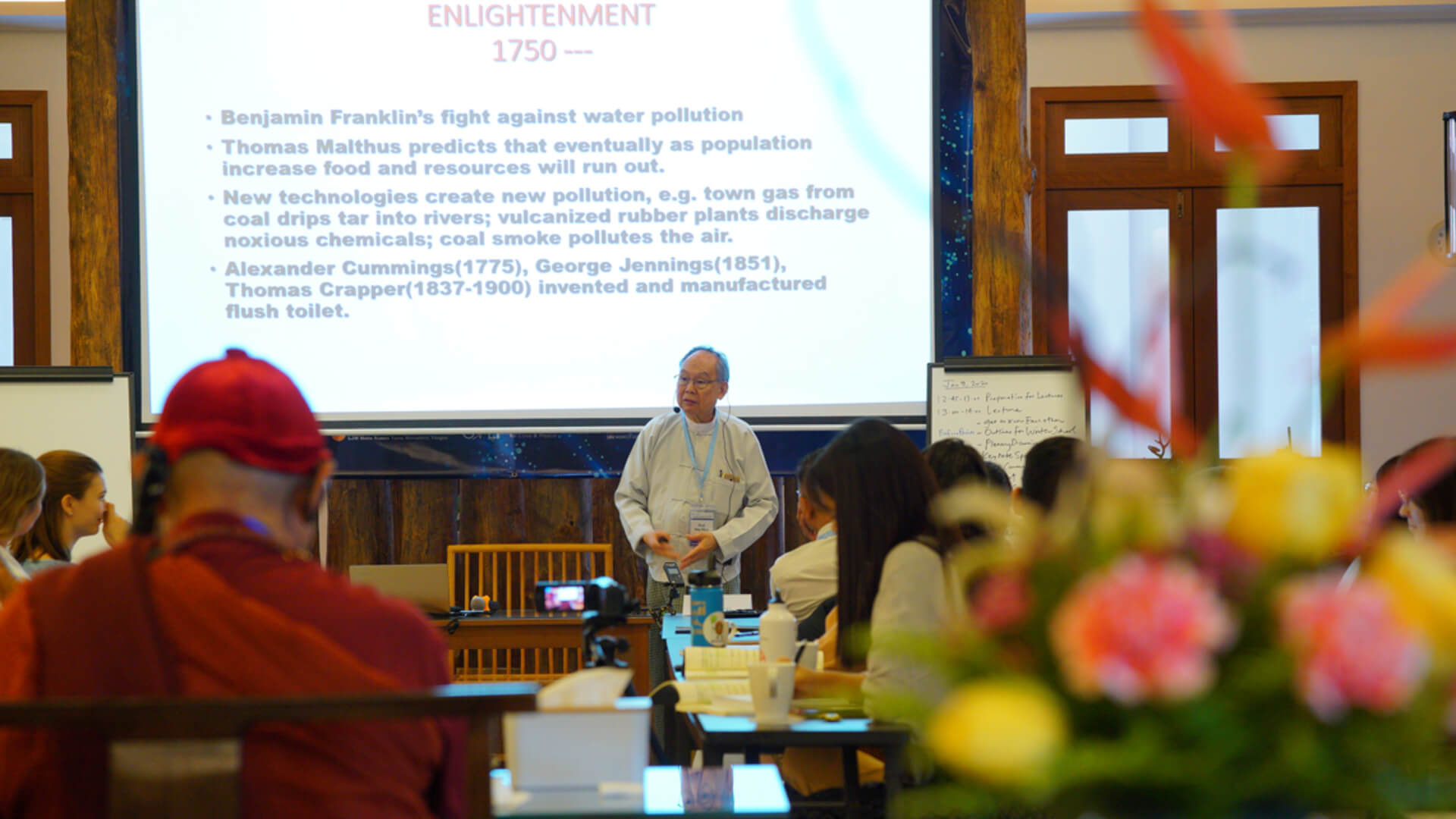
UN Expert Issues Dire Warning against Deteriorating Ecology
The future University for Life & Peace held a Commencement Ceremony for its Winter School 2020 on January 8 and featured a keynote speech by Professor Nay Htun, Honorary Patron & Founder of the Green Economy Green Growth Myanmar (GEGG) and former UN Assistant Secretary-General at UNEP and UNDP. GEGG has been organizing a number of significant forums over the past decade to explore themes on all things Green, sustainable development and ecological resilience.
Professor Nay Htun opened his keynote with two weighing quotes - “People ignorant of history will be punished by the past” and “Your tomorrow is decided by what is being done today” - to appeal for people's serious attention to our deteriorating ecology. Throughout mankind's civilizations from the past over the present into the future, limited natural resources like land, rivers, water, and forestry have forever been accessed and exploited excessively that inevitably accounts for our severely damaged ecology. Human history has since long revealed that fair and inclusive access to natural resources is always critical to mitigating disputes and wars. Professor Nay Htun further said that as early as some 2.5 millennia ago Buddha himself already discourse about the essence of an inter-reliant symbiosis, in that “one must respect all forms of life”.
Dharma Master Hsin Tao, Founding Abbot of the Ling Jiou Mountain Buddhist Society (LJM) , says that ecology has its roots in spirituality and life is an extension of the memory matrix. All things are interrelated and interdependent, and things impact one another in a diverse symbiosis, with none in the position of independent and stand-alone existence. The insight and the train of thought shared by Professor Nay Htun lend themselves well as explanatory remarks to Dharma Master Hsin Tao's philosophy.
Professor Nay Htun is of the opinion that Natural Laws dictate the protection of resources of water and air that belong to all people. Nature fights back when ecology suffers excessive abuses. Watershed cases in point include the Great Smog of 1952 in London that killed more than 4,000 people and prompted the British Government to legislate the “Clean Air Law” in 1956. That very same year 1956 also witnessed quicksilver poisoning in Japan's Kumamoto Prefecture, rendering patients impaired in motor motions, hearing, speech and dementia that could progress to bouts of spasm, even deaths. The Minamata Disease remains without cure even today.
It was around that time in the late 1960s when quite a few books on the environment became best-sellers to catch people's attention to public health issues. International limelight soon followed with consequent burgeoning actions. An environmental science book Silent Spring by American marine biologist Rachel Carson in 1962 took the world by storm with that arresting title alone - excessive use of chemical pesticides inflicted severe damages to ecology that Spring went silent with no bees and birds to usher in a new cycle of the year or life in general at that.
Marine biologists were not alone in becoming concerned with the environment, as Dharma Master Hsin Tao has also been proactive in environmental issues for quite some time over the years. His consistent contributions over decades to the Council for a Parliament of the World's Religions (CPWR) suffice to illustrate. At the Third CPWR in 1999, Dharma Master Hsin Tao delivered a keynote on paying respect to the universal environment without exploiting the Earth's resources excessively. At the Fourth CPWR in 2004, he spoke about his cosmic view on biology in search of a sacred root for the world's inter-reliant co-existence. The Fifth CPWR in 2009 saw the Master deliver an appeal for world peace and harmony that demanded environmental protection policies as a prerequisite as well as putting an end to insatiable human greed. Then the Sixth CPWR in 2015 was when the Venerable Master argued that meditation can help transcend people's state of mind and that Life & Peace is the core of a diversified symbiosis. The Seventh CPWR in 2018 was when the Master shared insight in global ethics of ecology as to be manifested by the University for Life & Peace project. In parallel to the CPWR and in 2019, the first Winter School of the future University for Life & Peace debuted in Yangon Myanmar as a pilot project. Winter School 2020 is set to transform consensus into action and run on the theme of “Healing the Earth: A Transformative Action of Ecology & Technology” with a faculty comprising of experts from 8 countries including the US, England, China, Myanmar and Malaysia, and the student body made up by elites from 11 world-renowned campuses like Yale, Cambridge and Peking University. The Winter School 2020 program aims to achieve workable strategies for transformative actions that interloop ecology and technology in the course of a fortnight.
The Winter School 2020's topical theme of “healing the Earth” also echoes Professor Nay Htun's working experiences at the UN. The highlight of his tenure of more than 20 years at the global body was action-taking besides promoting theories and contributing professionalism. That the UN declared June 5 “the World Environment Day” is evidence and proof that the world is urged to take the issue of environmental protection seriously and actual actions are called for indeed.
In closing, Professor Nay Htun shared with the audience this heartfelt statement - “Let us care for our common home, the Earth, with happiness, sharing, tolerance, and compassion. Future generations rely on what you do today, not tomorrow.”
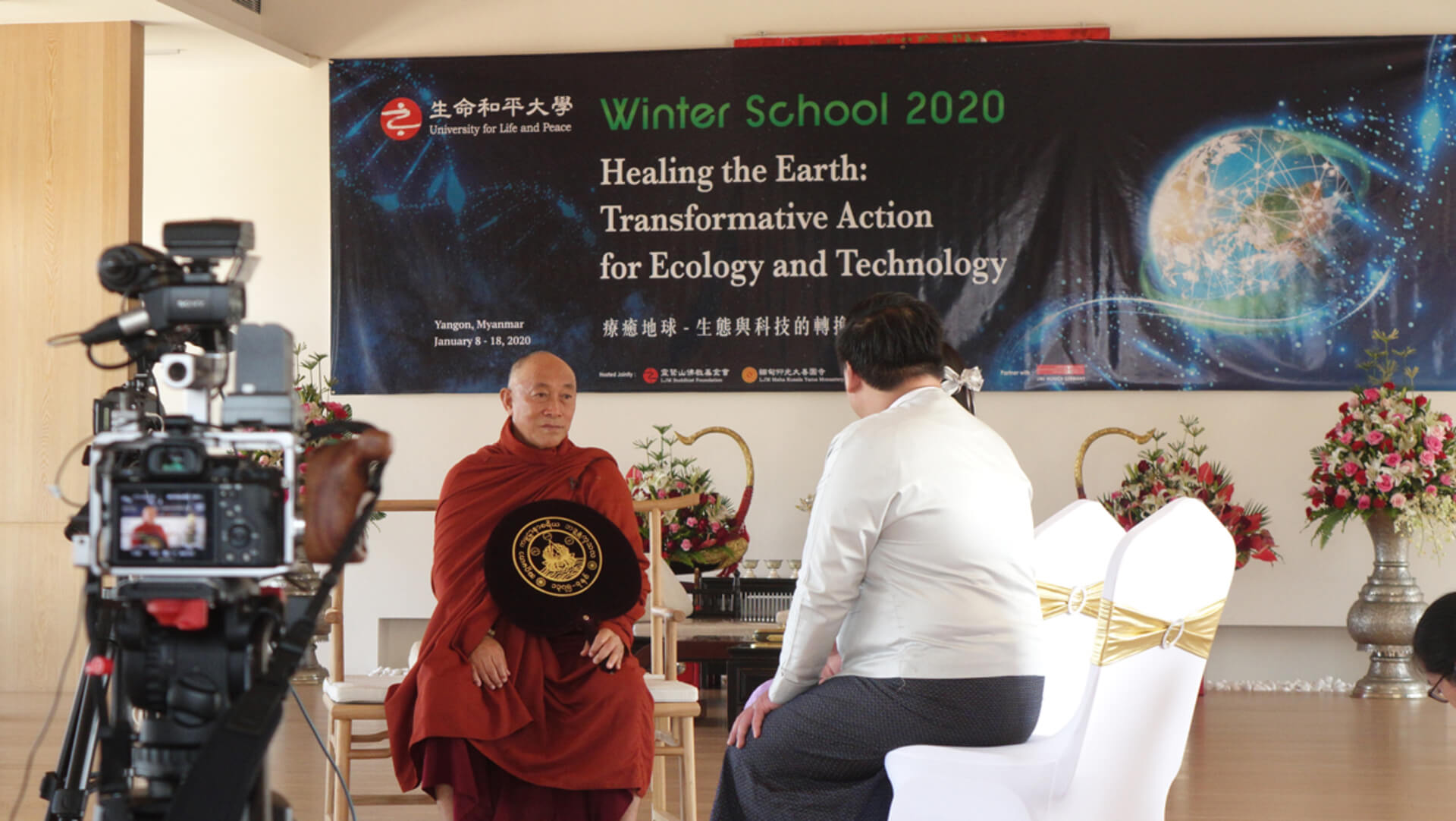
Media takes keen Interest in "Myanmar Day" by University for Life & Peace
With the global environmental awareness on the rise, the Government of Myanmar has given priorities to ecological issues and the co-operation with the Italian quango Istituto Oikos and the Lampi Marine National Park is a case in point. To conserve and protect ecological diversity. a thousand trees have also been planted in the Maha Kusala Yama Monastery of Ling Jiou Mountain (LJM) at Naung Mon. These are model examples for marine ecology and plantation and as such, they manifest LJM’s all-out effort of the ‘Loving the Earth / Loving Peace’ ideal and campaign.
As a pilot project of the future University for Life & Peace, Winter School 2020 in a program presently taking place in Yangon Myanmar with faculty members from eight countries like the USA, England, China, Myanmar, Malaysia, etc., and the student body made up by elites from eleven prestigious campuses like Yale, Cambridge, Beijing University, and so on. Winter School 2020 successfully captures media attention not just because it is a prestigious program dedicated to ecology, but because its in-depth contents for discourses shed light on what concerns Myanmar presently.
Winter School 2020 organizers built into the curriculum ‘The Myanmar Day’ as a platform that features expert talks on the country’s only marine national park, legal framework, administrative opportunities, suburban development, binding national and international laws on environmental protection, etc. LJM’s Master Heng Ming also shared his experiences in hands-on education and farming at a Naung Mon bio-farm. The media, eg. Radio Free Asia, had a field day with one-on-one interviews for in-depth feature stories.
Since the opening of the Winter School 2020 to-date, there have been many media contacts for, and coverage about, the pilot program. News programs such as UpToDate of Myanmar, Mingalaba for Myanmar-Singapore, and Myanmar’s authoritative TV network Sky Net. The latter with all its three main channels covering Buddhism, education, and news, sent reporters for on-location interviews as well as taping full-length footage of the curriculum of a fortnight for its rich and diversified contents. The curriculum seeks to explore the root causes for the conflict of natural resources, as well as issues on how to best optimize the ethics of biology by virtue of state-of-the-art applications of technologies. Discourses are conducted in formats ranging from forums over group discussions to role-playing, among others, to engage participants to the fullest towards optimal results.
Dharma Master Hsin Tao pointed out in an interview that the Earth’s problems with ecology have arisen from its disintegration from spirituality, and there are many examples in Buddha’s teachings that relate to ecology, and Buddha treats people and all beings with love and compassion. It was also mentioned that people’s insatiable appetite for material desires has led to excessive consumerism and the run-away emission of carbon dioxide, thereby causing severe damage to the ecology. All beings are born with innate spirituality and ecology makes no exception. But when people are blinded by endless desires, we lose sight of ourselves and the spirituality of a diversified symbiosis that is ecology.
Dharma Master also cited examples of the Naung Mon Bio-Farm, which grows produces without harming the soil in an effort to teach how to cherish and care for the land. Experiences of the Naung Mon Bio-Farm can be of value as key references for action plans of sustainability, while currently serving as materials for case studies for Winter School 2020.
Highly illustrative cases profiled and examined for sharing at Winter School 2020 afford the conviction that the increasing size of the world population disproportionately accelerates exploitations of natural resources, rendering it a daunting task to heal the Earth and restore the ecology. Dharma Master Hsin Tao hardly ever gives up any commitment and that applies to the present case in point. He subscribes to the notion that the future University for Life & Peace will enable solutions to healing the Earth by virtue of cross-discipline and -domain co-operations that embody transformative actions for ecology and technology.
As the highest-ranking and most revered Buddhist guru of Myanmar and himself the founder of five Buddhist universities, Sitagu Sayadaw Dr. Ashin Nyanissara personally attended the commencement ceremony of Winter School 2020 to give blessings. Sitagu Sayadaw approves of the theme of ‘Healing the Earth’ and the curriculum built around that theme, and he asked for a set of copies of the program contents for sharing among the universities he founded.
Myanmar enjoys a long history of upholding Buddhism as its hereditary, priceless assets. Local media, therefore, find it convincing the way how Dharma Master Hsin Tao explains the positive interrelations between spirituality, ecology, and technologies and how the future University for Life & Peace will transform theories into practices, how the innovative interactions for learning will be capable of generating energy of wisdom to positively impact people for 360-degree self-examinations and concrete lifestyle changes for collective action plans that ensue.
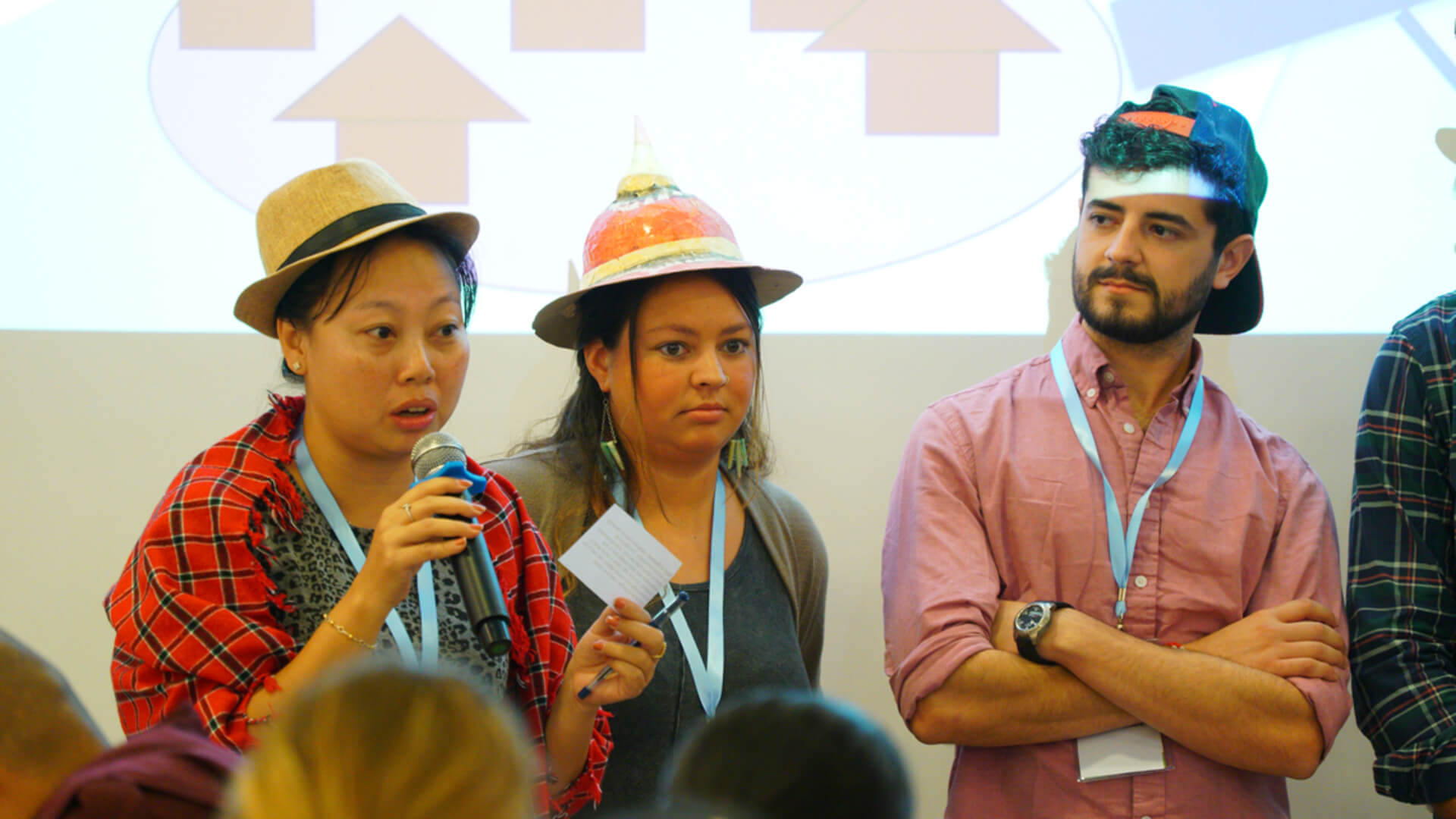
"Loving the Earth" begins with Soil for Non-Toxic Farming the Ling Jiou Mountain Way
‘Loving the Earth’demands action beyond slogans and thrives on international cooperation and exchange of experience. The Government of Myanmar has been cooperating with the Italian not-for-profit quango ‘Istituto Oikos’ on a master management plan for the Lampi National Marine Park. The project has succeeded in protecting the natural ecology while improving the livelihood of local residents thanks to its friendly tactics of communications over time. On the other hand, the Ling Jiou Mountain (LJM) bio-farm at Naung Mon has delivered a successful model for non-toxic farming and made a donation of 2 metric tons of microbial fertilizers to the Northern Shan State to manifest the ‘Loving the Earth’ ideal in words and in deeds. When such comparable campaigns keep mushrooming in different parts of the world with people working hand in hand across borders, the Earth will have a better tomorrow with certainty.
Conservation of Marine Ecology to curb excessive Fishing
Situated at the southernmost of Myanmar, the Lampi Marine National Park of Ecology consists of 20 islands, where migrants live amongst the indigenous Moken people. As Lampi is a protected habitat for a diversity of more than 50 species of land and sea creatures, it was declared a national park of ecology as early as in 1996. But local people had adopted excessive fishing to the extent that extinction of marine produce became a tangible crisis, prompting the Ministry of Forestry of Myanmar to cooperate with the Italian quango Istituto Oikos on a master management plan for the Lampi project
Project Manager of the Lampi Marine National Park project, Elisa, believes that turning local stakeholders to special interest parties was critical in winning over their support. A master management plan, according to Elisa, would only be realistically deliverable when it is based on intelligence gathered from local residents by listening to them carefully to understand their culture. Both sides learned how to grow and develop and the indigenous Mokens eventually adopted lifestyle changes.
The project team employed communications and education to illustrate to local residents what would happen if excessive fishing were to continue. They also provided coaching and training aide for eco-tourism highlighting fish farms. Local participants benefited from their involvement and trust with the project team grew, as were their willingness and readiness to comply. Elisa pointed out that it is essential to secure understanding on the part of the locals, and full empowerment equipped local participants with a strong sense of ownership so that they would want to do more for their Lampi Marine National Park. The process of implementing the project, however, was not without challenges. Some stakeholders, for instance, were too dominant to listen to opinions other than their own. When more and more people became involved, the decision process only got increasingly complicated.
Toxic-free Farming at Naung Mon: A Success Story & A Win
While Lampi Park is in the south of Myanmar, we have a corresponding success story for international environment protection with the LJM eco-farm at Naung Mon in northern Myanmar. As early as in 2005 when Dharma Master Hsin Tao first decided to start farming in Naung Mon, chemical fertilizers and pesticides were rejected. Farm crops grew naturally in the field unweeded.
Master Chang Le who manages the eco-farm recounted the development of the LJM Farm at Naung Mon as toxic-free with no negative impact on ecology, citing examples of taking out the pest, restoring the soil’s fertility, and the use of microbial fertilizers, etc. Lemongrass was planted for harvesting and the fragrance is a natural repellent. And the farm produces its own supply of microbial fertilizers.
Master Chang Le of the LJM Buddhist Society offered examples to explain about the plus points of using microbial fertilizers in an analogy with us taking probiotics to help with the digestive systems. An import of new know-how from Taiwan, the microbial fertilizers contain 8 types of bacteria such as Bacillus subtilis and Trichoderma harzianum that work well for soil improvement in the space of strengthened resilience and immunity while contributing to the reduction of pest damage.
In 2018 the Naung Mon Eco-Farm began to show a growing diversity of inhabitants including red dragonflies, frogs, horsehair crabs, and wild bees, with eagles soaring over the mountain tops at dusk. All these are signs pointing to an ecosystem closing in on driving full circle. Once a full-fledged eco-chain emerges, bio colonies feed into one another to strike a natural balance that removes the need to use chemical fertilizers and pesticides harmful to the land, animals, and people.
The LJM Eco-Farm at Naung Mon has established itself as a teaching site for toxic-free farming for experience sharing via visitations and has received formal recognition by ranking government officials of Myanmar. A case in point follows.
His Excellency Linn Htut, Governor of the Shan State, was a guest of honor at the opening ritual for the Sitting Buddha of the LJM Maha Kusala Yama Monastery in Naung Mon on December 4, 2019. The Prime Minister of the Shan State, His Excellency Linn Htut also went on a guided tour at the eco-farm to take in a brief by Master Chang Le. Of the many accomplishments of the eco-farm, its function in offering hands-on demo sessions to help local farmers is particularly meaningful. A donation of 2 metric tons of microbial fertilizers was made on the occasion of His Excellency’s visit to benefit other Shan State regions beyond Lashio as a manifestation of the ‘Loving the Earth / Loving Peace’ ideal both in words and in deeds.
Interactions exercising mutual impact is a constant in an ecological environment, which is why Venerable Master Hsin Tao always emphasizes a diversified symbiosis and an interdependent coexistence as a core essential to the ethics of ecology. Discussions of ecological issues necessarily involve both spirituality and material matters, as in the case of special interest group communications without ignoring their standpoint nor overlooking the economic benefit that ensues. Toxic-free farming at the Naung Mon Eco-Farm was borne out of love and care for the land, with which spiritual strengths the toils yield positive merits to change material matters in the environment. That in sum is the original intent that propels Dharma Master Hsin Tao forward without failing in the mission of creating the future University for Life and Peace.
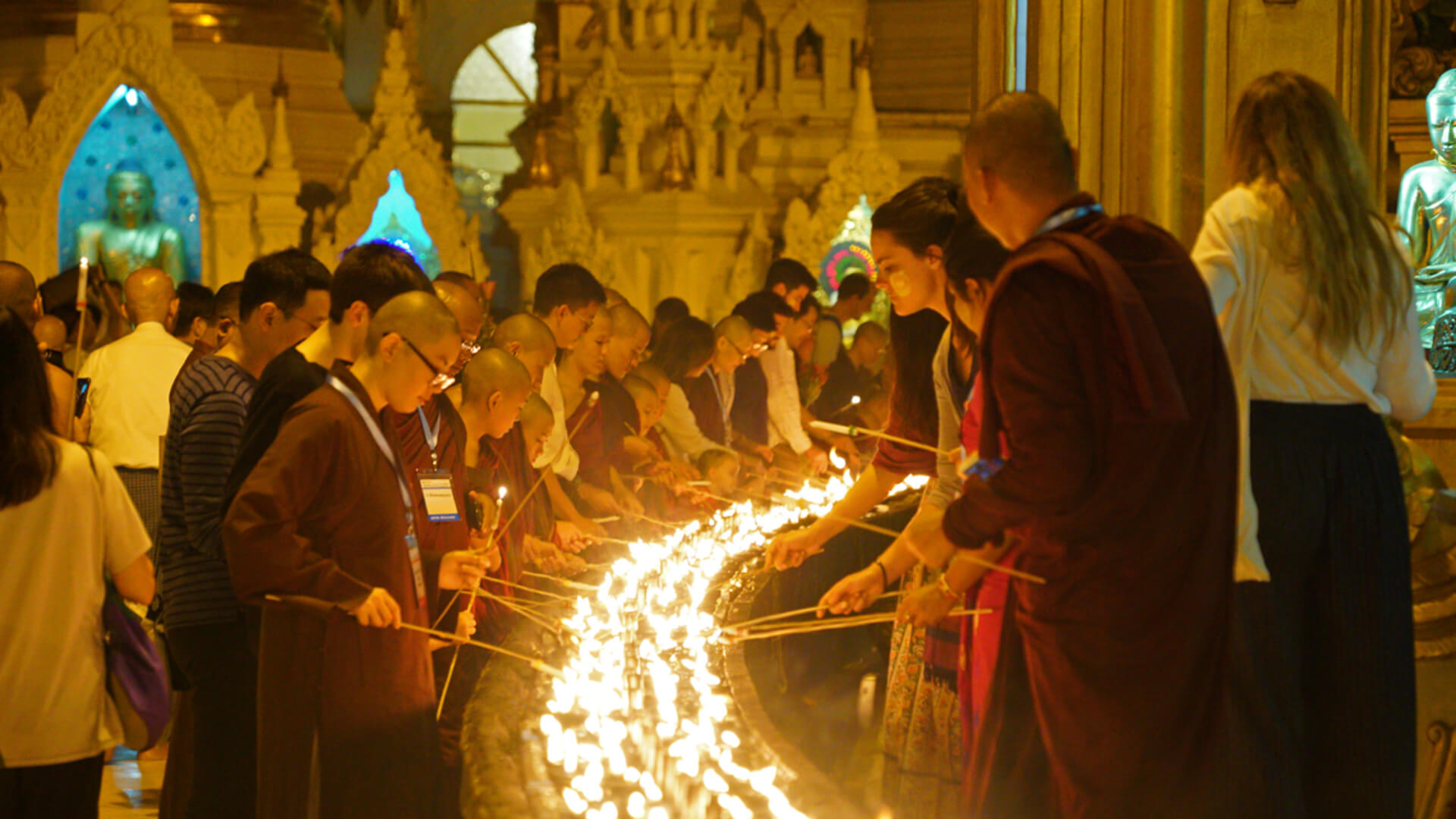
Myriad Candlelights at Shwedagon Pagoda to heal the Earth: Dharma Master Hsin Tao
The Winter School 2020 program of the Ling Jiou Mountain (LJM) University for Life & Peace project is, in essence, education on the ecology of a diversified symbiosis as well as a spiritual education. A recent off-site activity led to the visit to three major reservoirs of Yangon at Hlawga, Gyo Phyu, and Phugyi respectively, for personal experience and observation. The Winter School 2020 group also visited Yangon’s world-famous tourist attraction of the Shwedagon Pagoda to kindle a myriad candlelights for a quiet session of meditation and prayers for the loss of countless lives fallen in the Australian Bushfires as well as for the long-stay of Buddha’s Dharma on a safe and secure Earth.
Flanked by young Sramanas from Yangon and Naung Mon and leading Winter School 2020 participants, Dharma Master Hsin Tao took the 100-plus strong entourage to the Shwedagon Pagoda and lit up ten thousand candles to pay respect and homage. A sizeable flower signage showing the abbreviation of the future University for Life & Peace in three capital letters ‘ULP’ served as the background for a group photo of the visitors. Whereas Venerable Master Hsin Tao took the lead in practicing meditation and paying tribute to Buddhas by circulating the Pagoda, Winter School 2020 participants were quick to optimize the opportunities by seeking answers from Dharma Master Hsin Tao to their respective questions.
One participant was curious why the calming and harmonious atmosphere of the Shwedagon Pagoda triggered a sensation similar to a prior experience felt during the visit to an aged construction in Hungary. Dharma Master Hsin Tao responded by pointing to the empowering strengths of religion that help steady and steer our way in business and life in general. There is love in every one of us, but we need to love to manifest that sense of belonging and of happiness. The Master further said that nothing is more luminous than our own heart and mind when in tranquility, and that is our innate spirituality, only sometimes kept away from us and oftentimes enshrouded by wanton desires that know no limits.
Winter School 2020 programs start daily with yoga in the morning and wrap up at night with meditation. Program design has a built-in mechanism to help participants retrieve spirituality in different ways. The visit to Shwedagon Pagoda suffices to illustrate the claim just made. The student body of Winter School 2020 expressed genuine appreciation for the program design that loop in both spirituality and ecology, and the innovative teaching methodology has made life-changing experiences possible.
Dharma Master Hsin Tao inserts a constant reminder in the program back-to-back, in that spirituality is love and without which the spirituality itself would be nowhere. Love means the care for, and inclusion of, people, things, and all sentient beings. When there is love within us, the desire to protect ecology comes naturally, which goes a long way in rendering it obvious that awakened humanitarianism must function as the base to all projects of sustainability. And spirituality makes us understand that a diversified symbiosis and an interdependent coexistence have since day one been the basic game rule of ecology that allows positive interactions for life to go on eternally.
Right in front of the glittering Shwedagon Pagoda, Dharma Master Hsin Tao quietly led a session of meditation. The energy field that arose amidst the quiet and harmony of the group meditation allowed access to our innate spirituality besides the sense of bonding between ourselves and the universe. The Master then led the group in citing and chanting prayers to let our collective heart and mind vibrate the Earth’s magnetic field with a resonance so much so that the power of our hearts at peace jumpstart its self-healing capacities for Mother Earth and everything in it, too.
► Pictures
Chan Meditation & Technology: Ling Jiou Mountain takes Action to heal the Earth
The Ling Jiou Mountain (LJM) Winter School 2020 as a pilot project for the future University for Life & Peace in Yangon, Myanmar came to a fruit-bearing closing for its fortnight program on January 18. The theme of Winter School 2020 was ‘Healing the Earth: Transformative Actions of Ecology & Technology’, to which both the faculty and the student body contributed by putting their brilliant minds together for actionable wisdom meeting the demand of the challenge in healing the Earth.
An extracurricular event was a ceremony for the donation of K200Mn (the Burmese currency of Kyat) injected into the reserve fund for the future University for Life & Peace by LIU Zheng-Xiang, the Chairman and the CEO of the Fully Light Group of companies. The gift was made because Liu was deeply impressed by LJM Founding Abbot Dharma Master Hsin Tao's action in creating the future University for the ideals of loving the Earth and ecology, and the efforts for sustainability. Mr.KU Chi, the General Manager of Fully Light Group Yangon Region was present on the occasion on Liu's behalf.
A short film documenting highlights of the Winter School 2020 program, such as the visit to the 3 major reservoirs and the meditation and prayers in front of the famous Shwedagon Pagoda, produced happy smiles as screen images rekindled warm flashbacks. Dharma Master Hsin Tao made a present to every faculty lecturer for their all-out efforts.
Phyo Phyo Wai of Myanmar said that she was both excited and bewildered a bit at the beginning but then realized that the program was solid, and she learned about the tranquility inside by means of yoga and Chan meditation. She also practiced mindfulness while at it. She knows with certainty that the Earth is exposed to unprecedented crises, and it is critical to address ecological issues by bringing together professionals with different expertise. Interactions and group discussions helped her outgrow her habitual way of thinking, and she made a promise to herself to continue practicing things she learned to care about the Earth even after the program ended.
Winter School 2020 program saw the inclusion of meditative practice and the participants loved it. Professor Michael von Brueck pointed out that ‘halt’ and ‘observation’ are characteristic of Chan meditation - in that ‘halt’ means focus and concentration, whereas ‘observation’ refers to insight that allows see-through to the essence of things. Chan meditation awakens our spirituality that heals ourselves as well as the Earth. The explanation is not mere theory and changes only result from actual deeds. We must have the capacity of insight to influence and to impact. Thus accordingly, the LJM Maha Kusala Yama School of Sramaneras in Naung Mon is a good case in point. Professor von Brueck also said that we find ourselves in the long river of history and transformations are necessary, in that mankind must transform to adapt to changing environments to survive. We need to have the courage and a loving heart for the Earth to change the way things are and use technologies to heal the Earth. Calamities will take tolls on the Earth if changes fail to happen.
Dharma Master Hsin Tao expressed appreciation for the all-out efforts on the part of each and every faculty member. He also expressed gratitude to the donation by the Fully Light Group and his readiness for the future University was thus further enhanced. Venerable Master Hsin Tao pointed out that ecology is a diversified symbiosis and an interdependent co-existence. Put succinctly that means we are OK when you are OK. Spirituality is a balance between our innate nature and the external ecology, and that equilibrium between the individual and personal world and the collective universe is what the future University for Life & Peace is all about. Awakened spirituality allows a clear insight into our innermost self, and only when such is the case that we will be on the right track to go about resolving problems to ultimately reach an equilibrium between the inside and the outside.
In closing, Dharma Master Hsin Tao reminded everyone to bring back two precious treasures from the Winter School 2020 program, i.e. Chan meditation and (a new perception of) technology. Chan meditation guides us on the way back to spirituality and the realization that our heart at peace can tune positive energy for resonance in sync with the universe to bring out an equilibrium that settles disputes and imbalance. Awakened spirituality creates a strength that is love and compassion. The other treasure is the wisdom to put technology to good use to heal the Earth by transforming damages inflicted upon the Earth via manmade disasters.
Following the closing ceremony, the LJM Winter School 2020 program in Yangon came to a satisfying end that signals the beginning of a new chapter for every participant. All members of both the faculty and the student body are seeds of peace for global ecology. As Dharma Master Hsin Tao's blueprint for the future University for Life & Peace unfolds, Winter School participants will take part and share the Earth-healing actions that manifest the ideals of ‘Loving the Earth / Loving Peace’. With that, it becomes clear that the future University for Life & Peace has the trigger mechanism to help turn the world's common fate around and keep alive the hope that the Earth forever remains a fertile home for a diversified and interdependent symbiosis.
► Pictures
